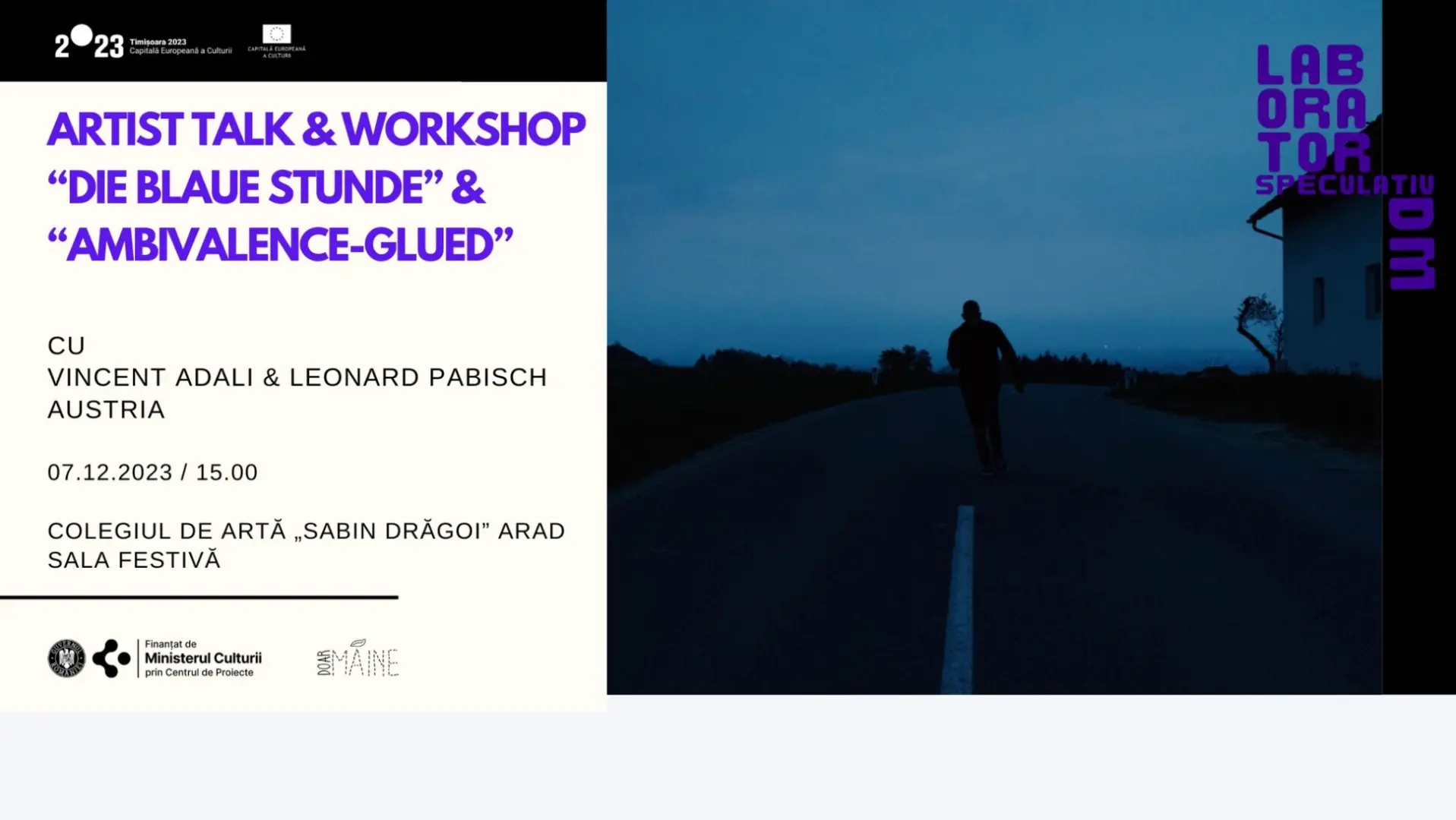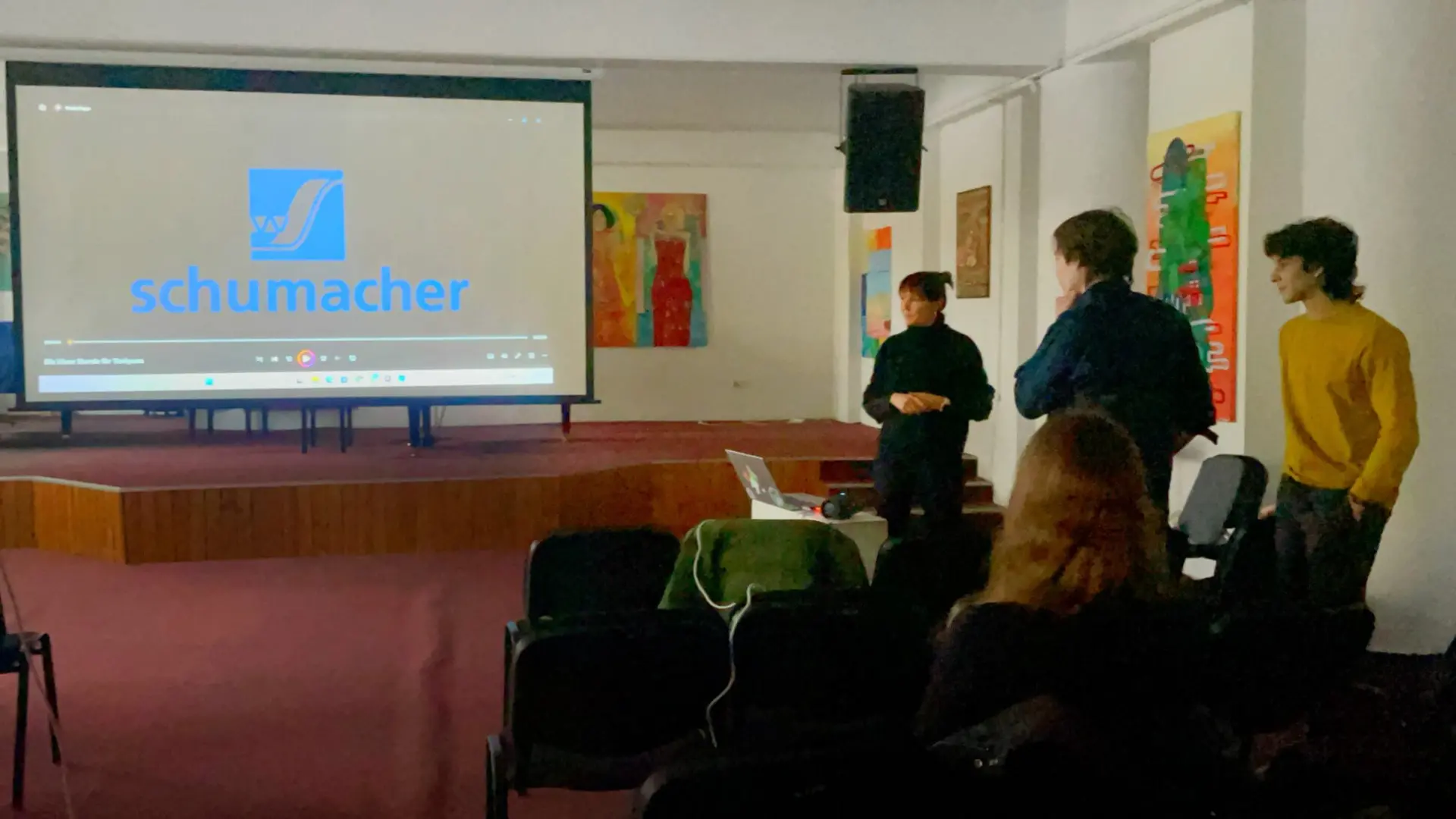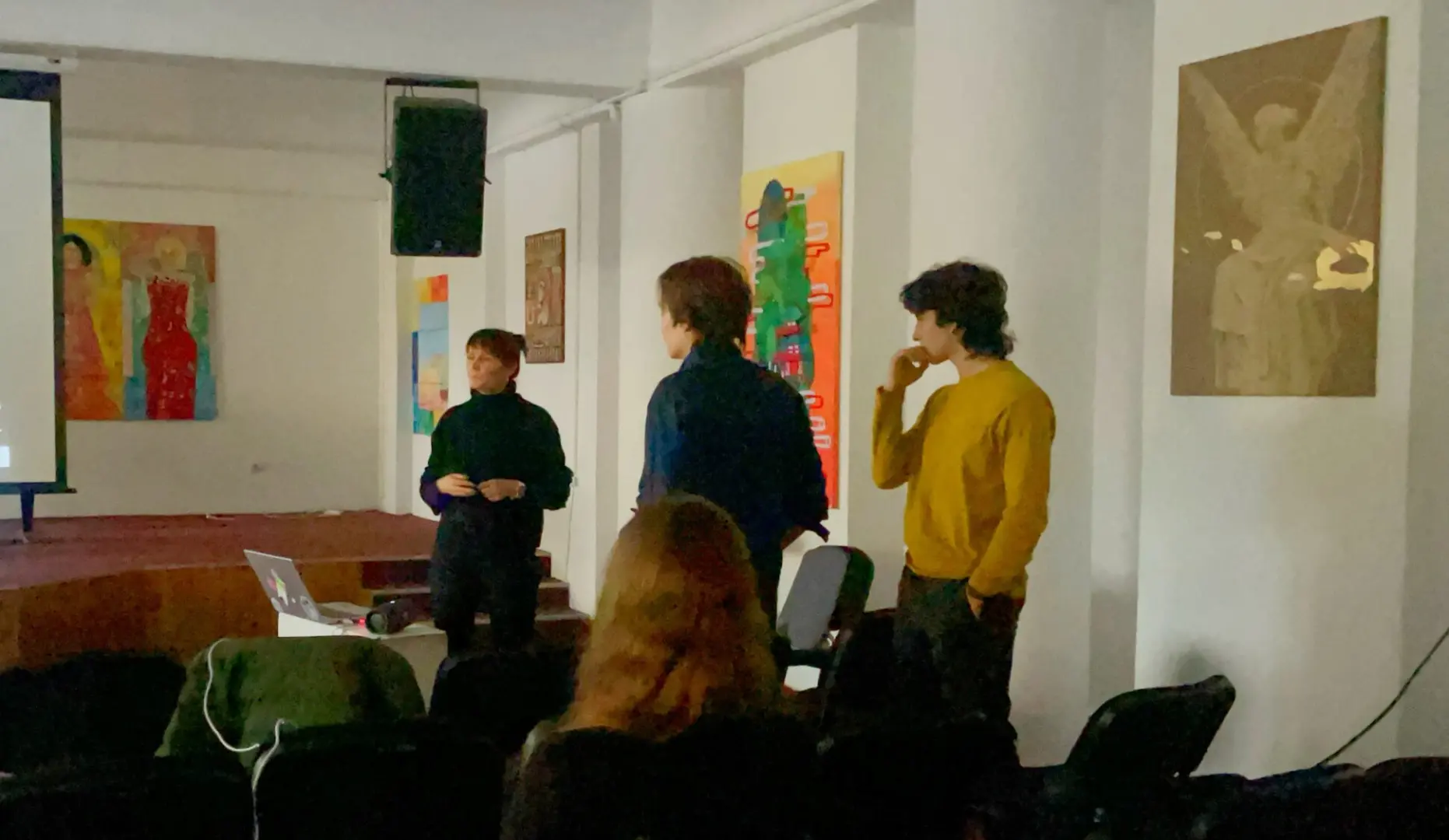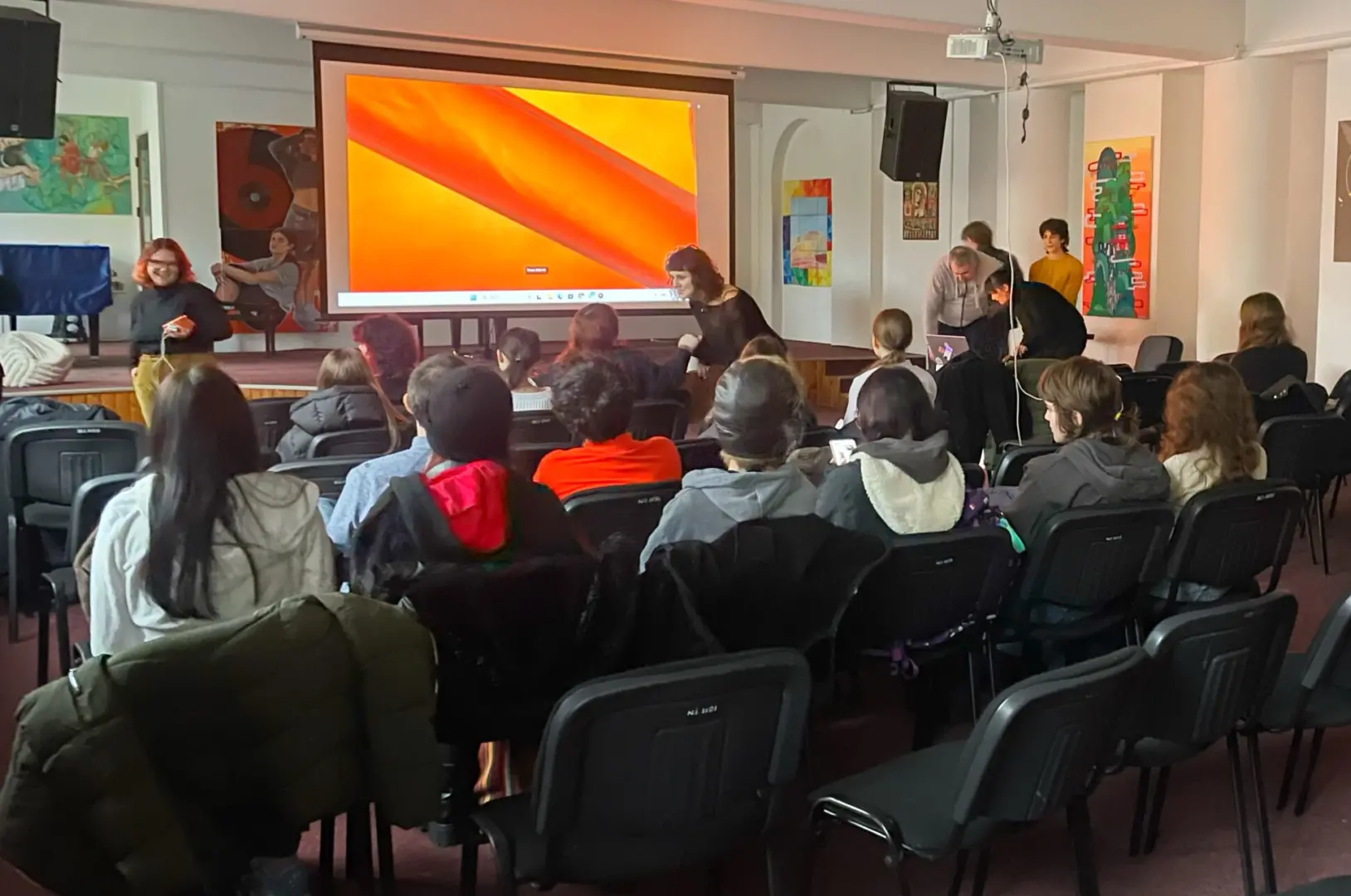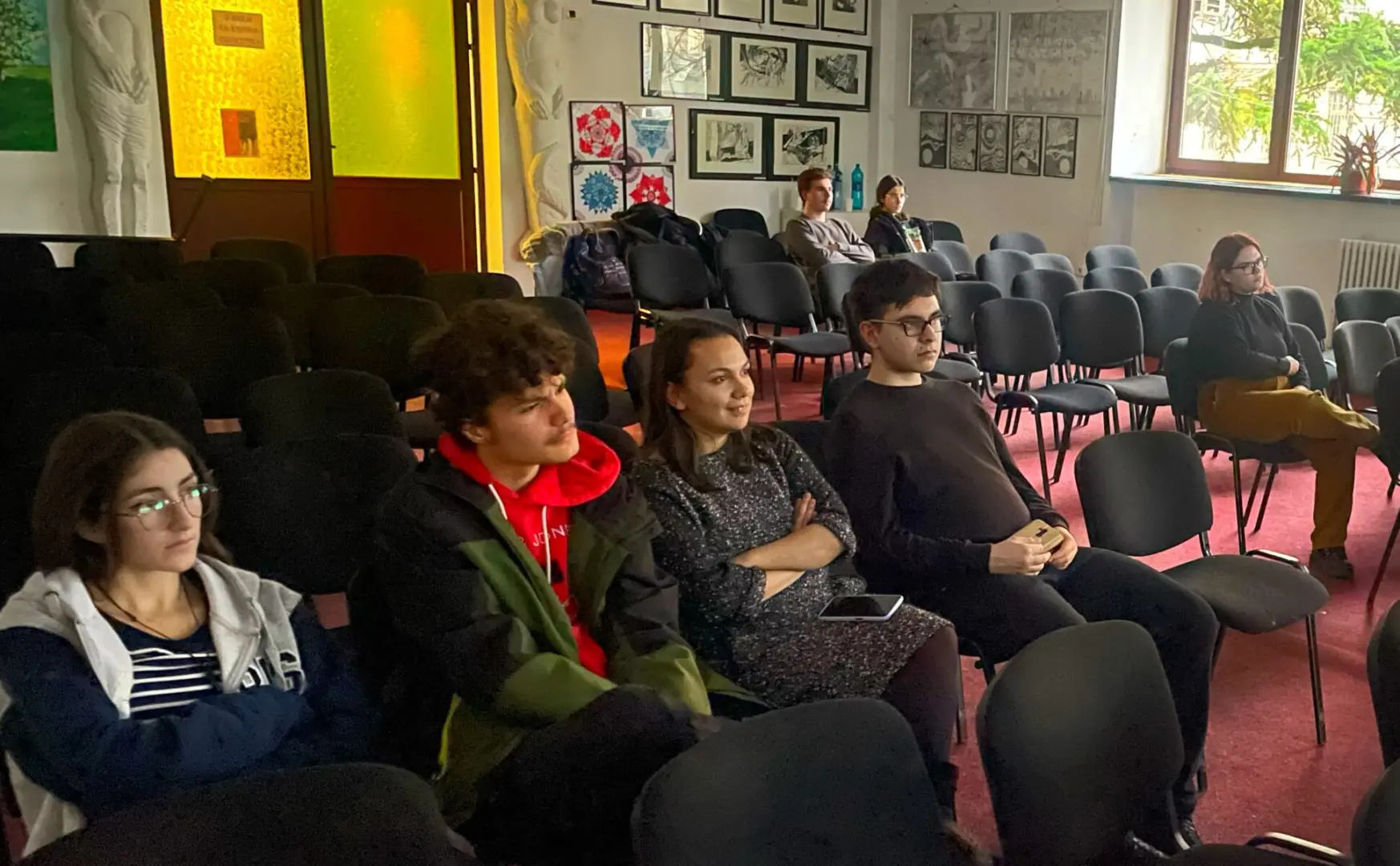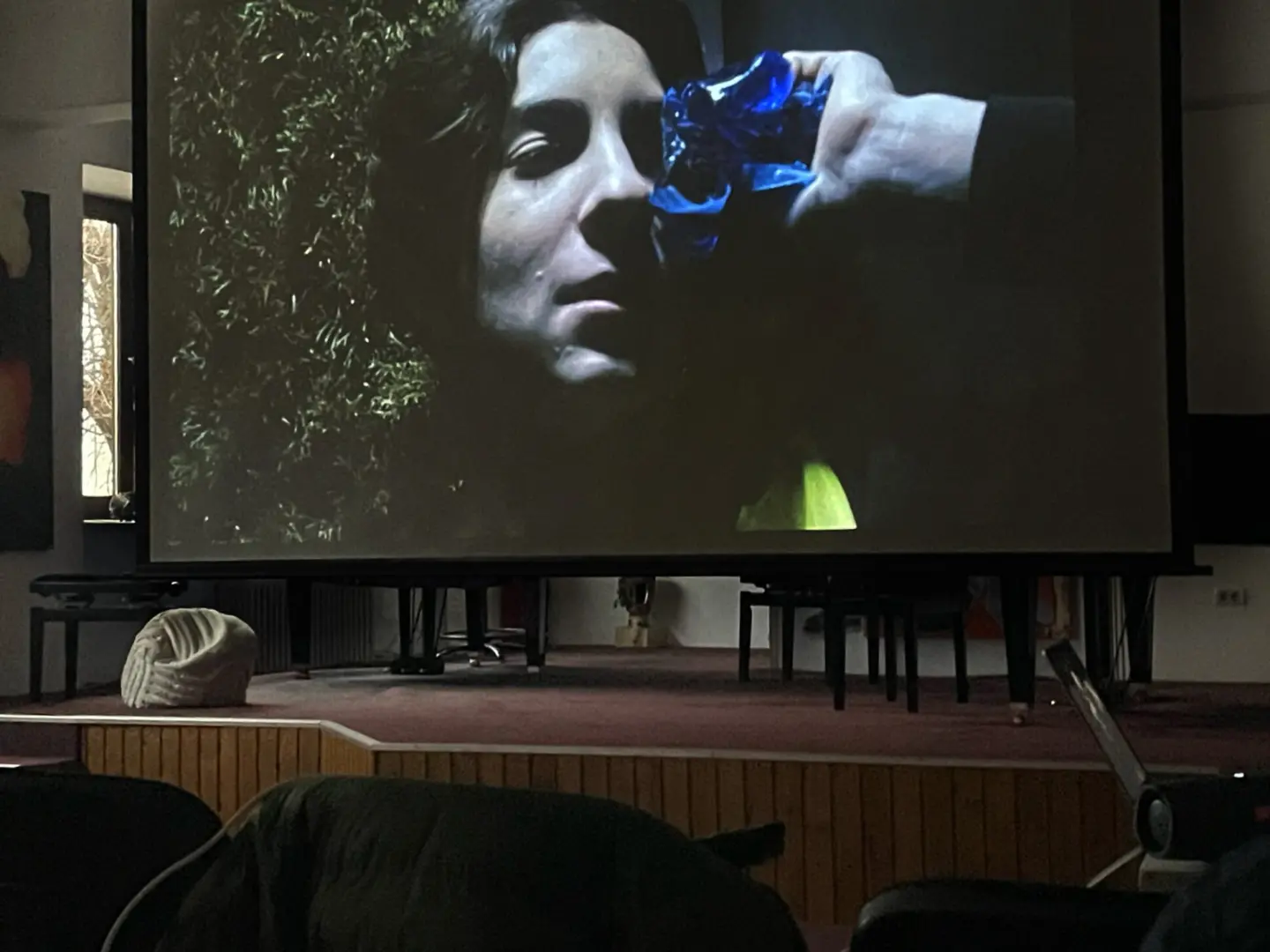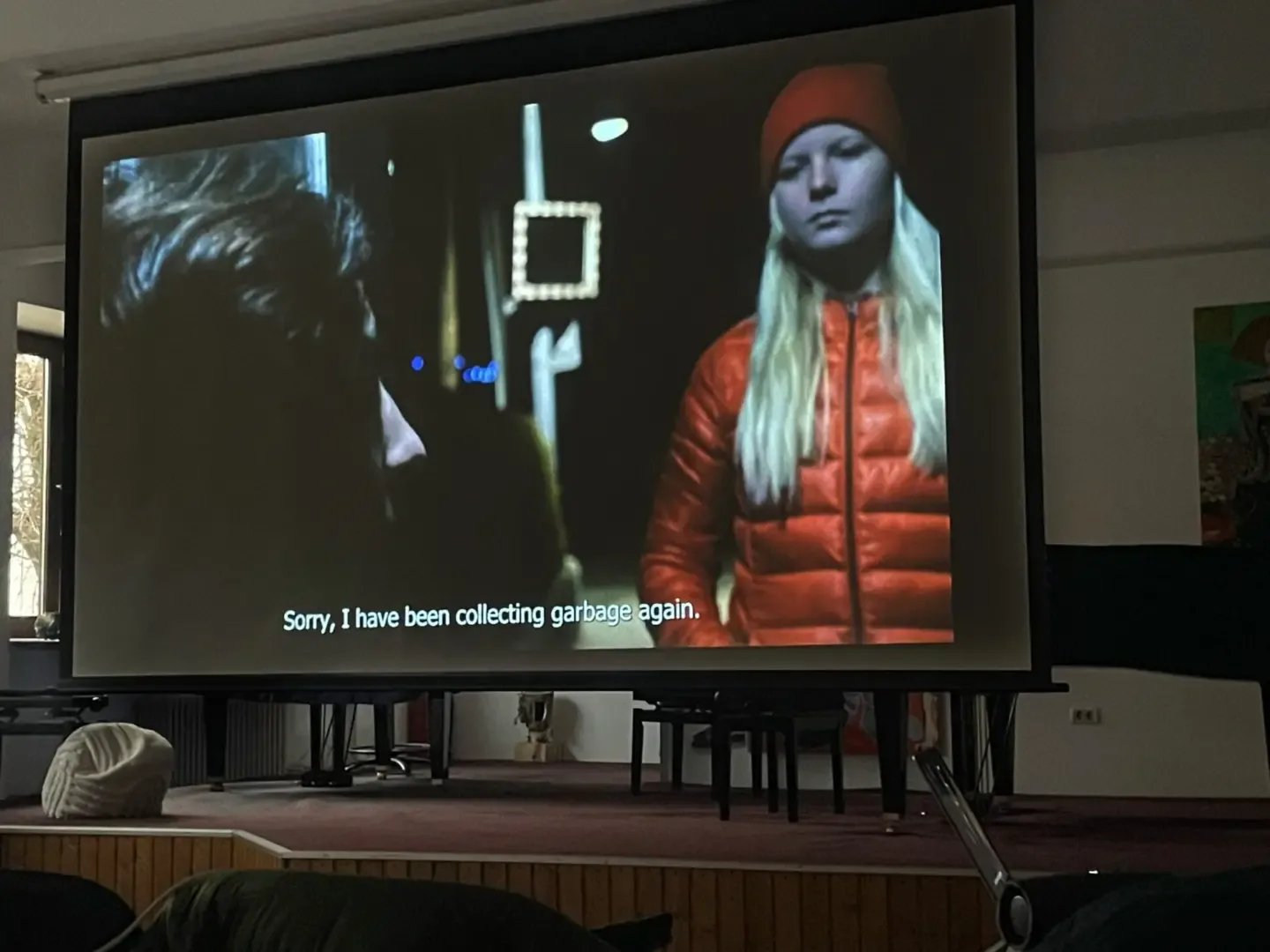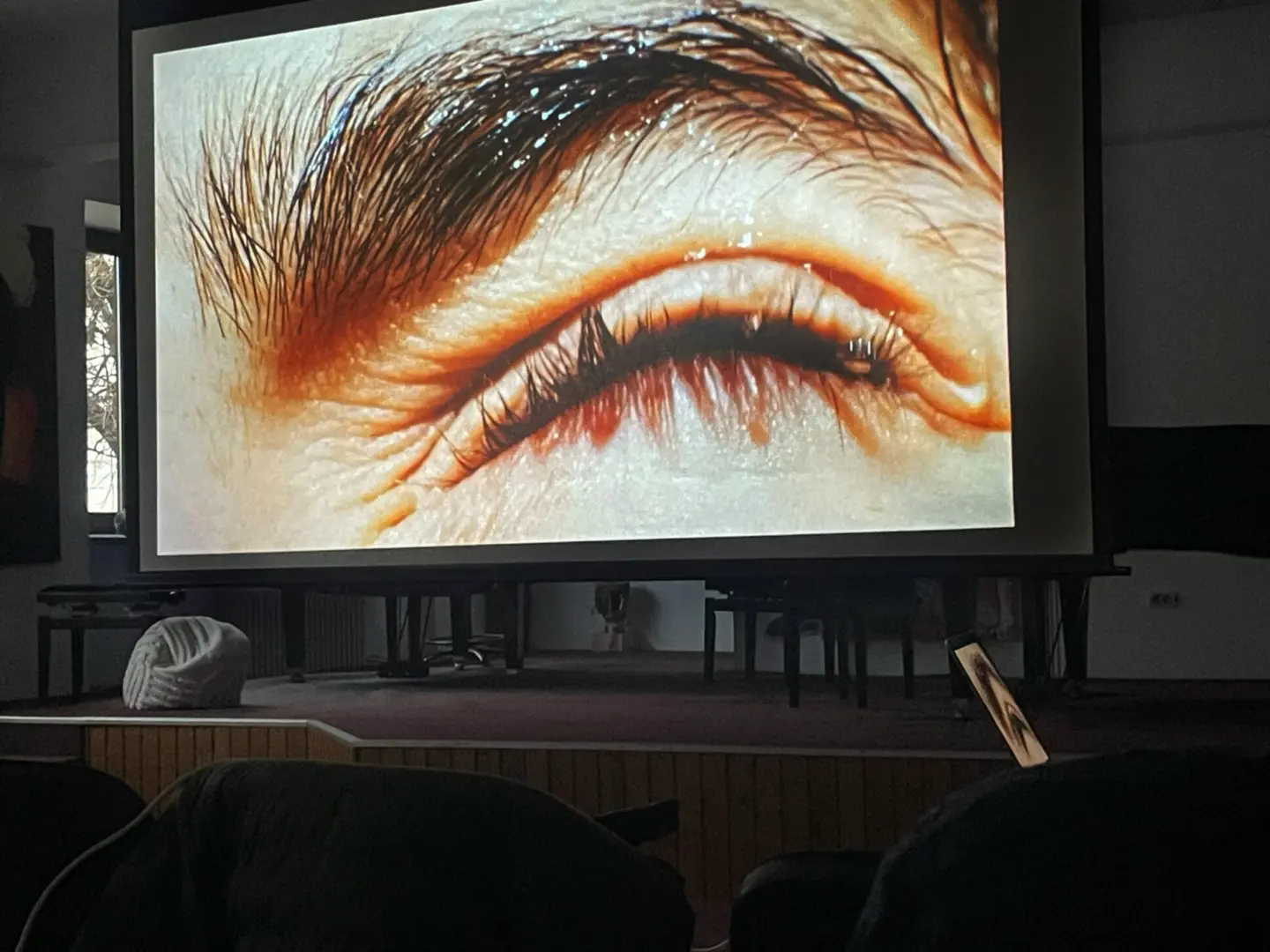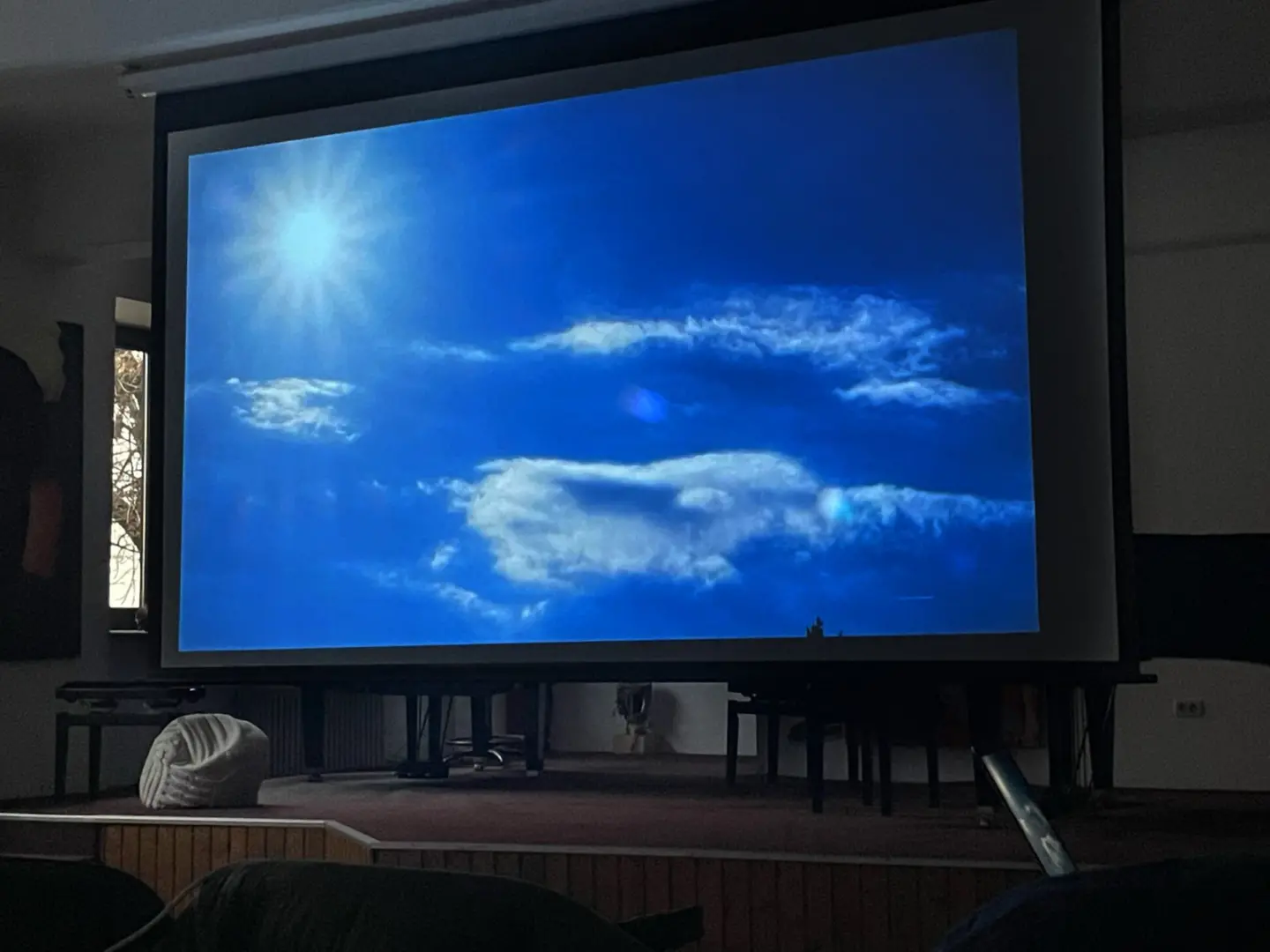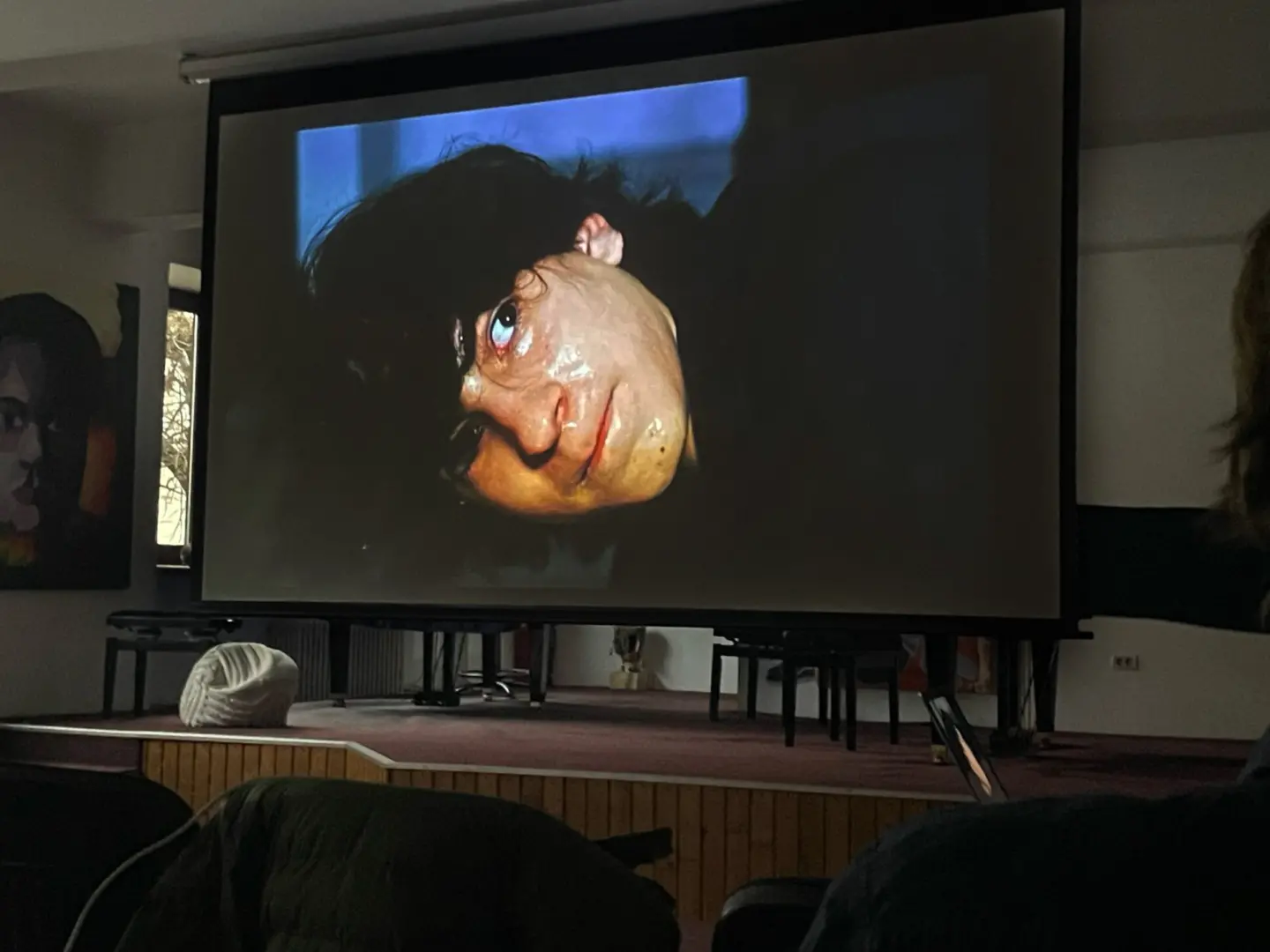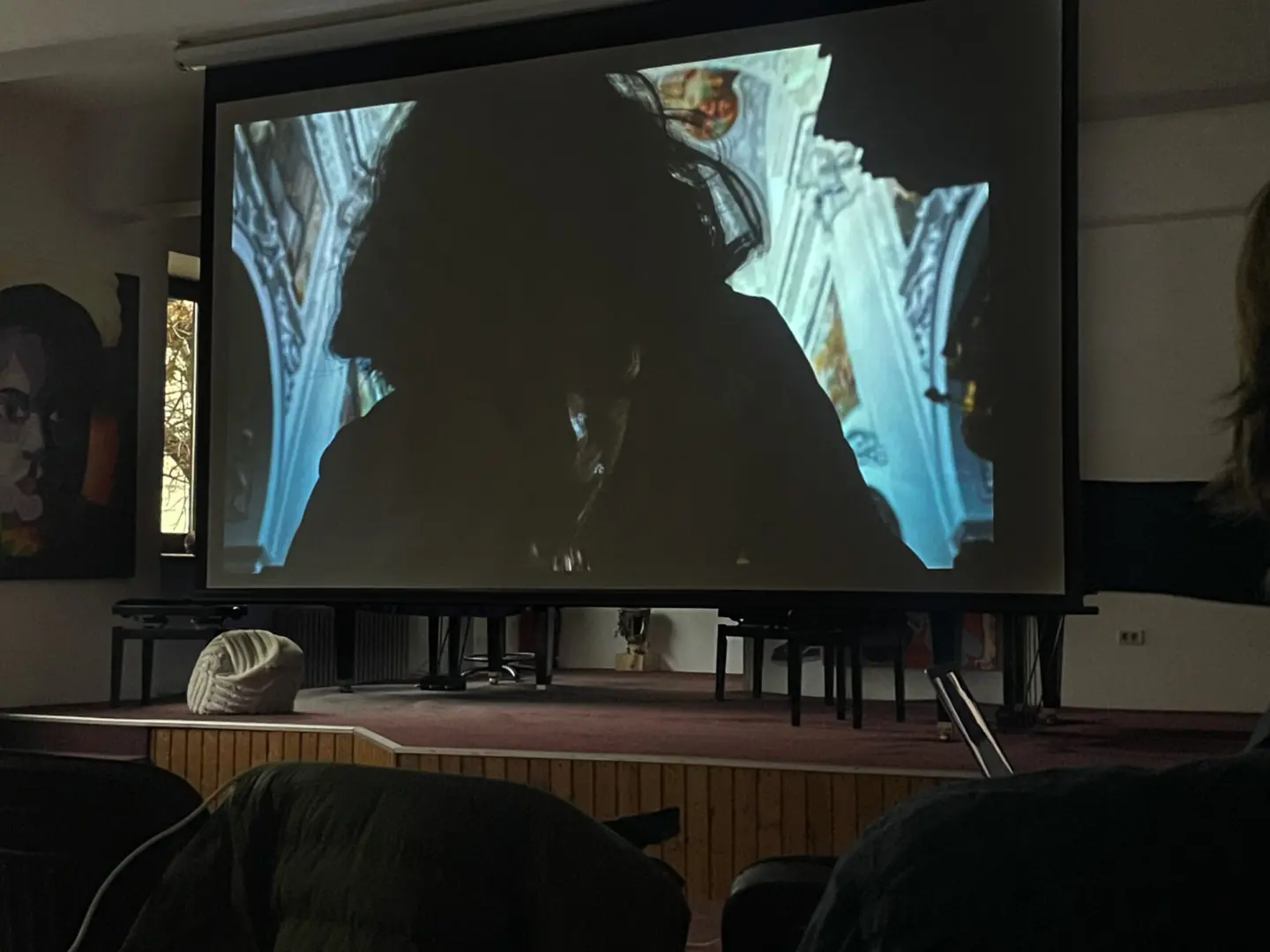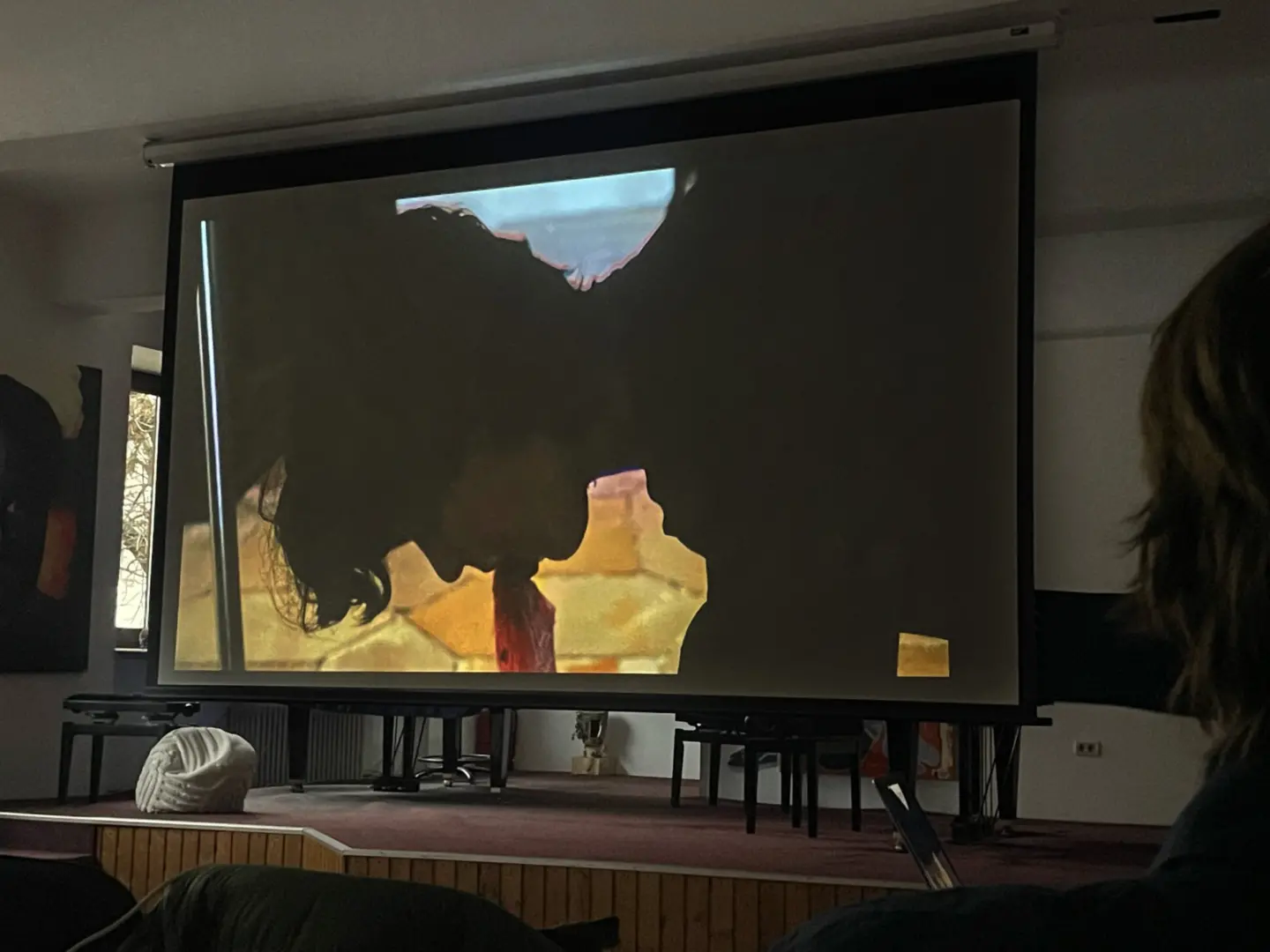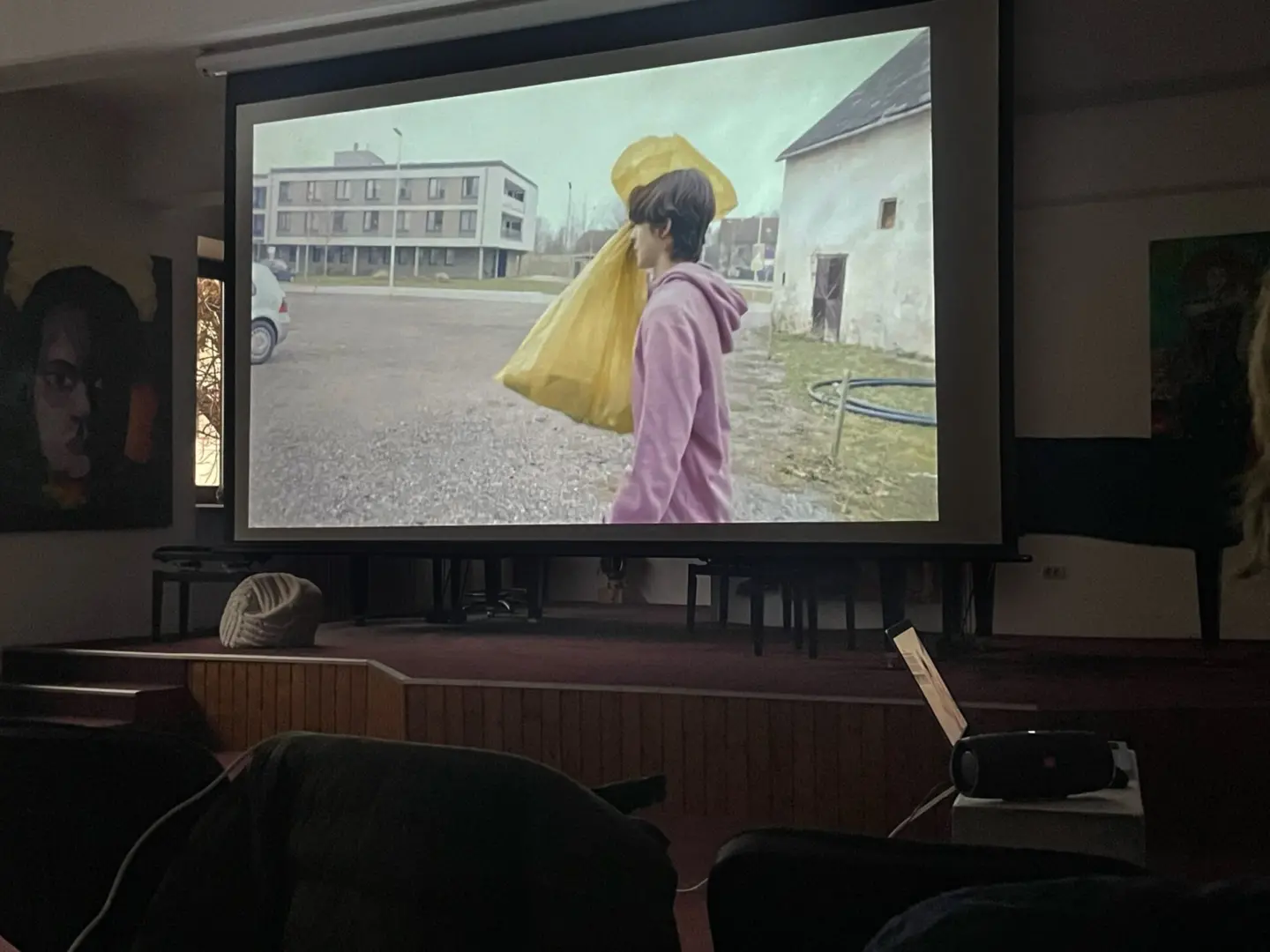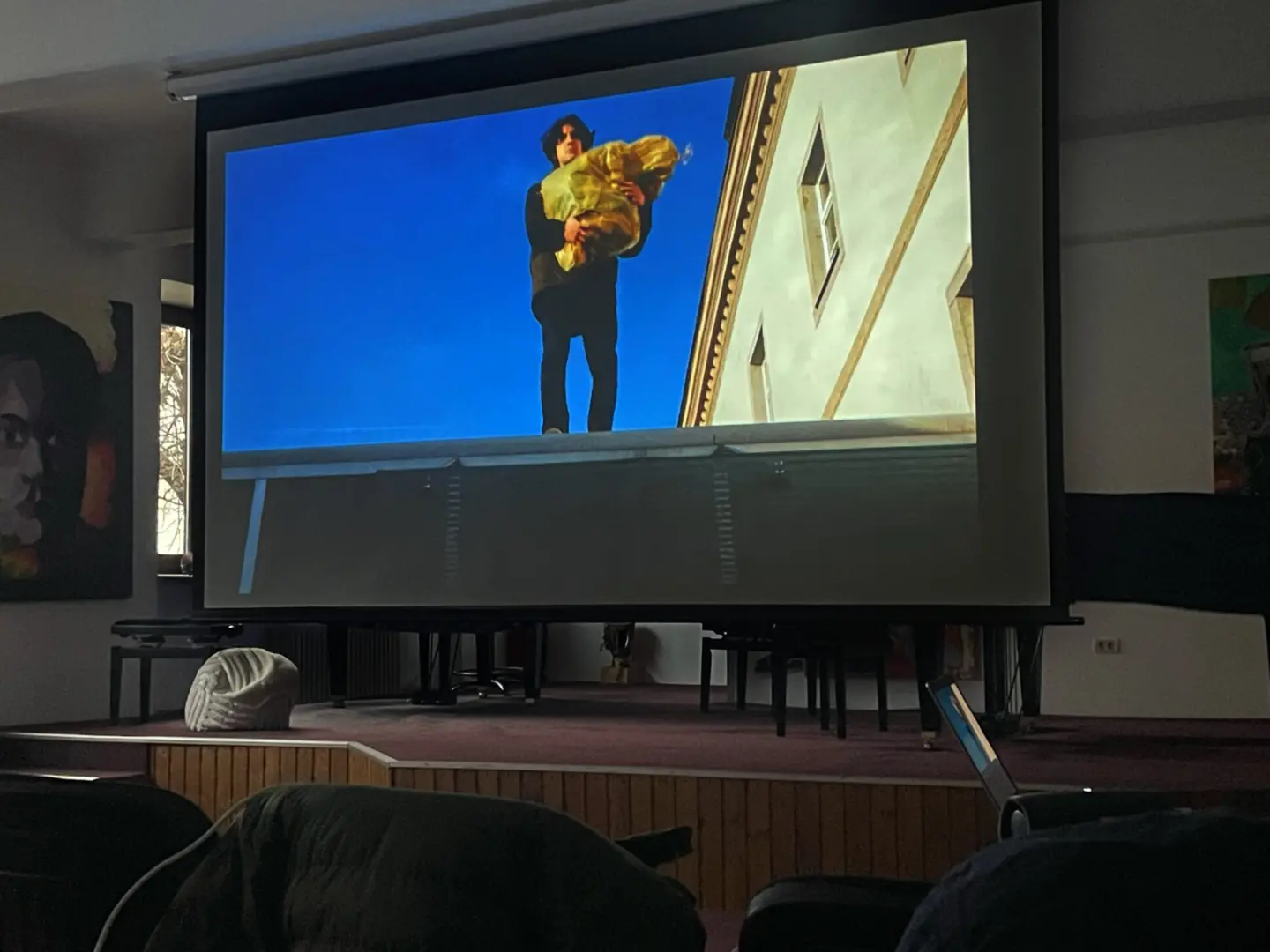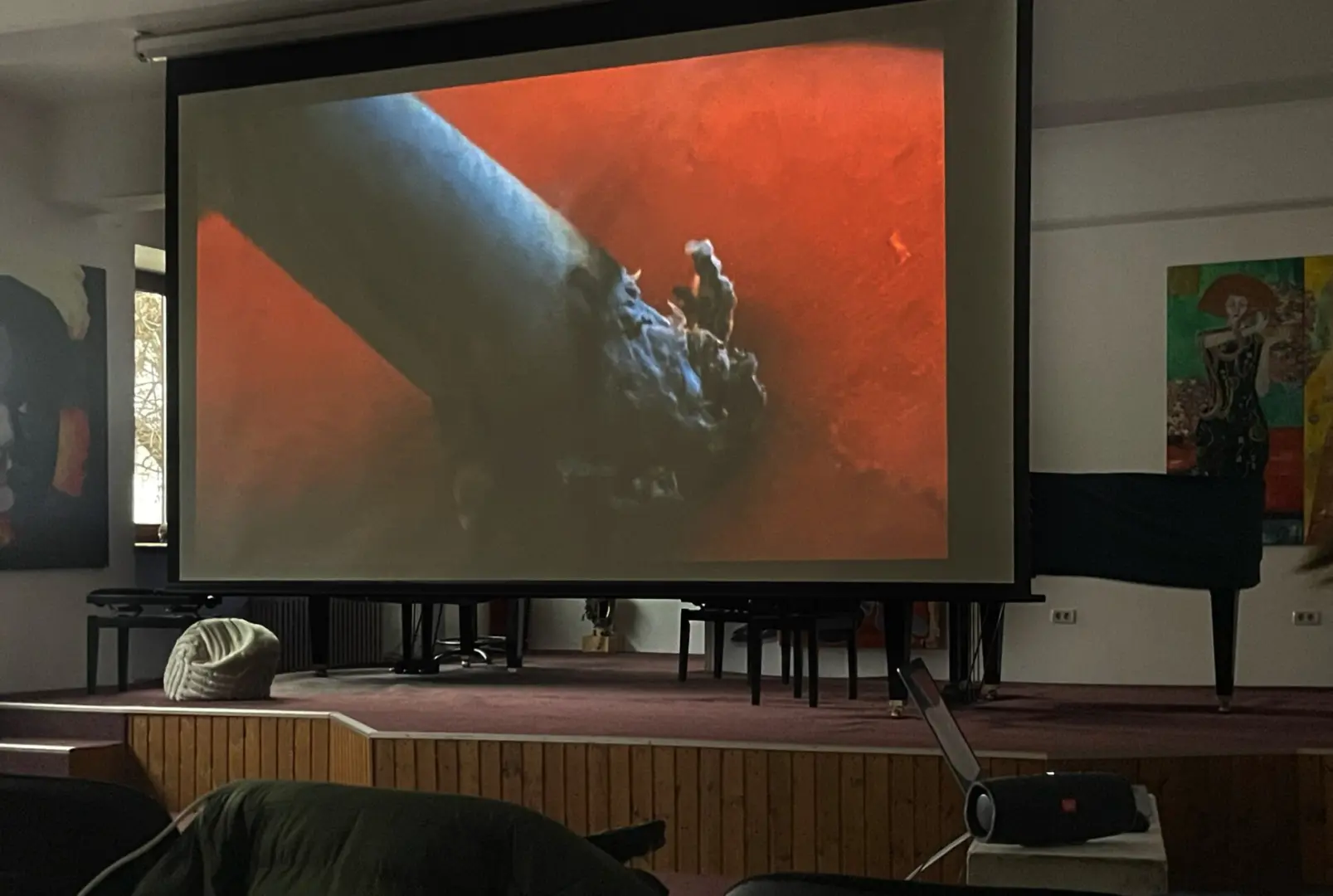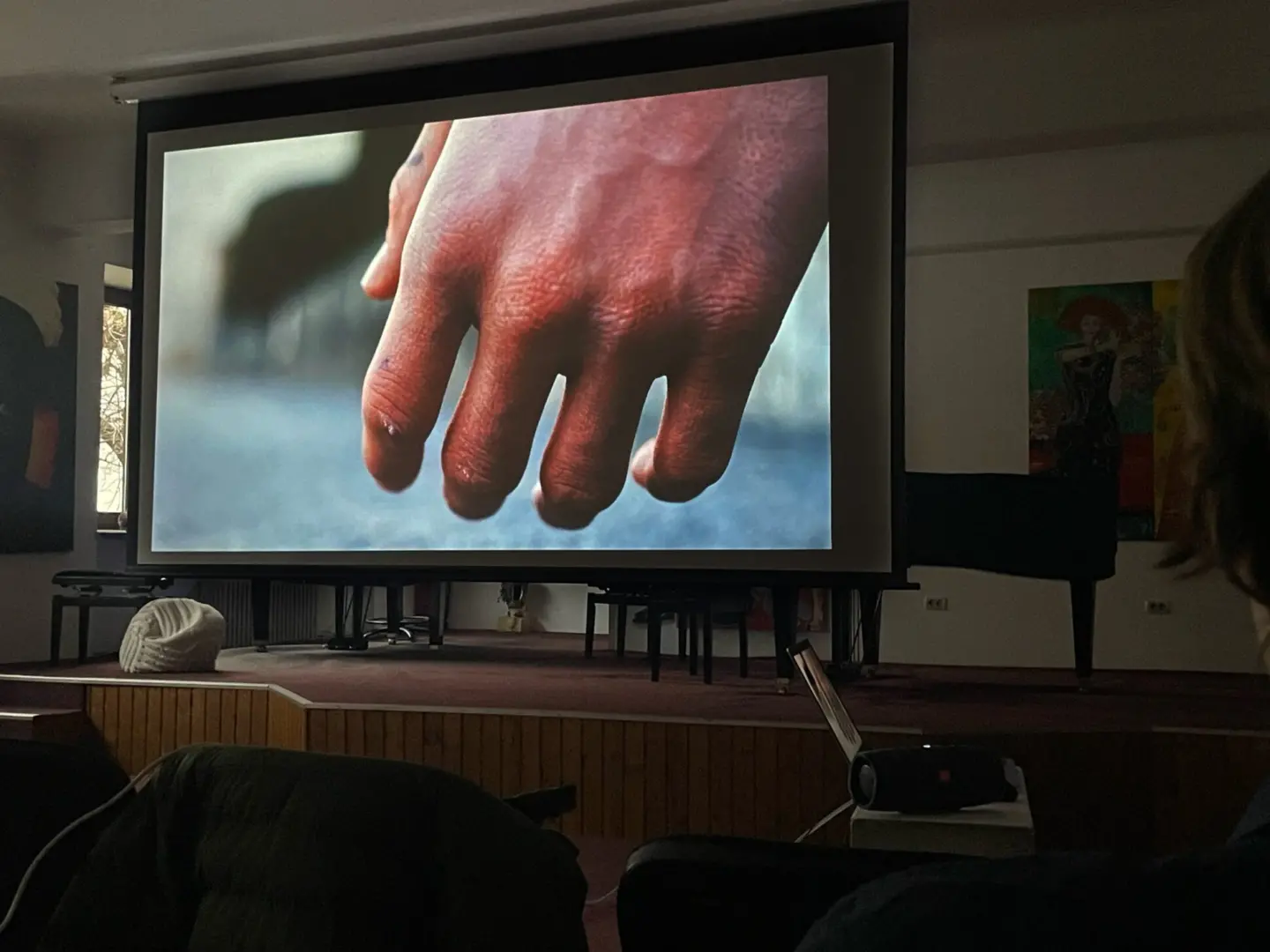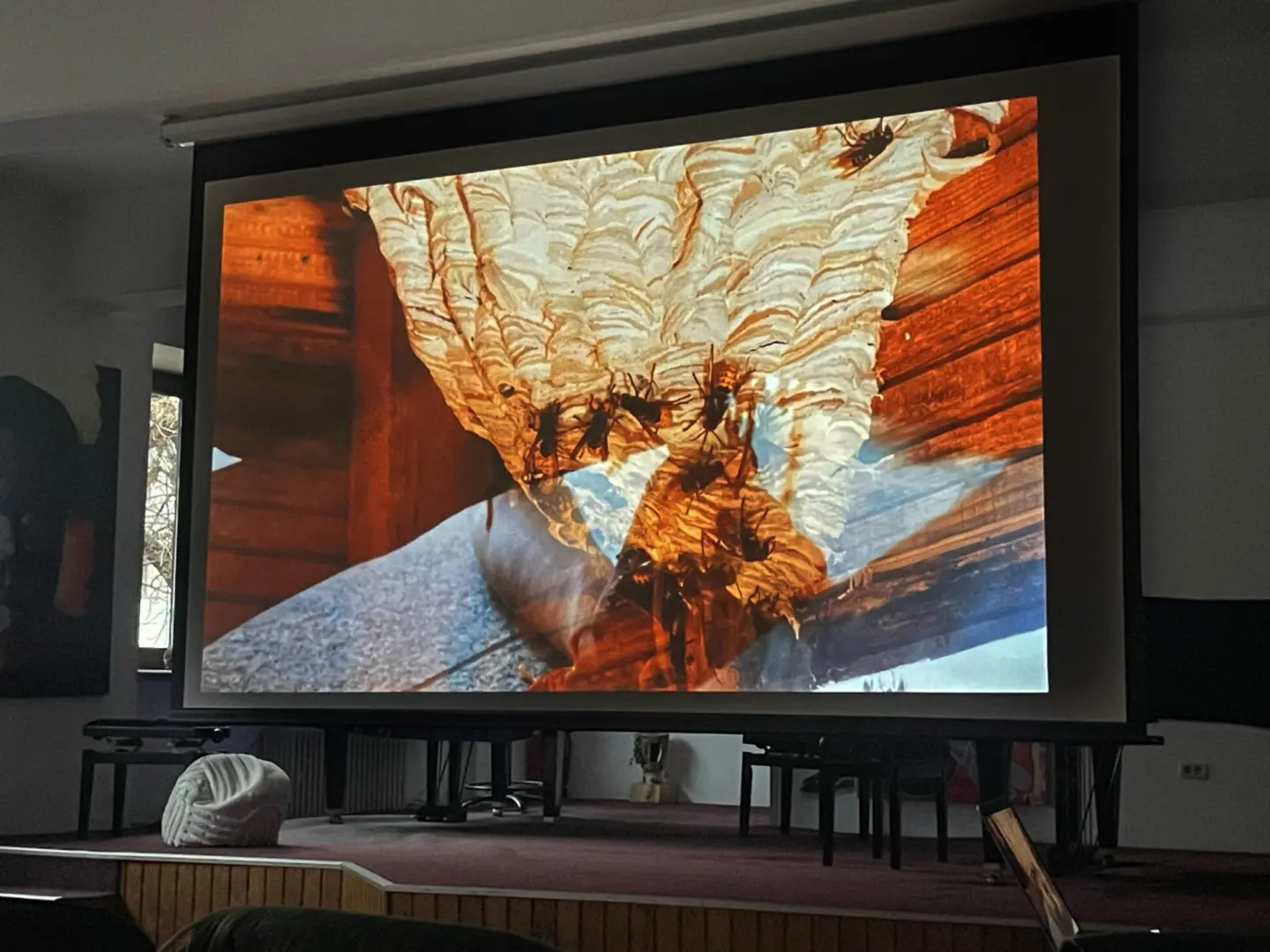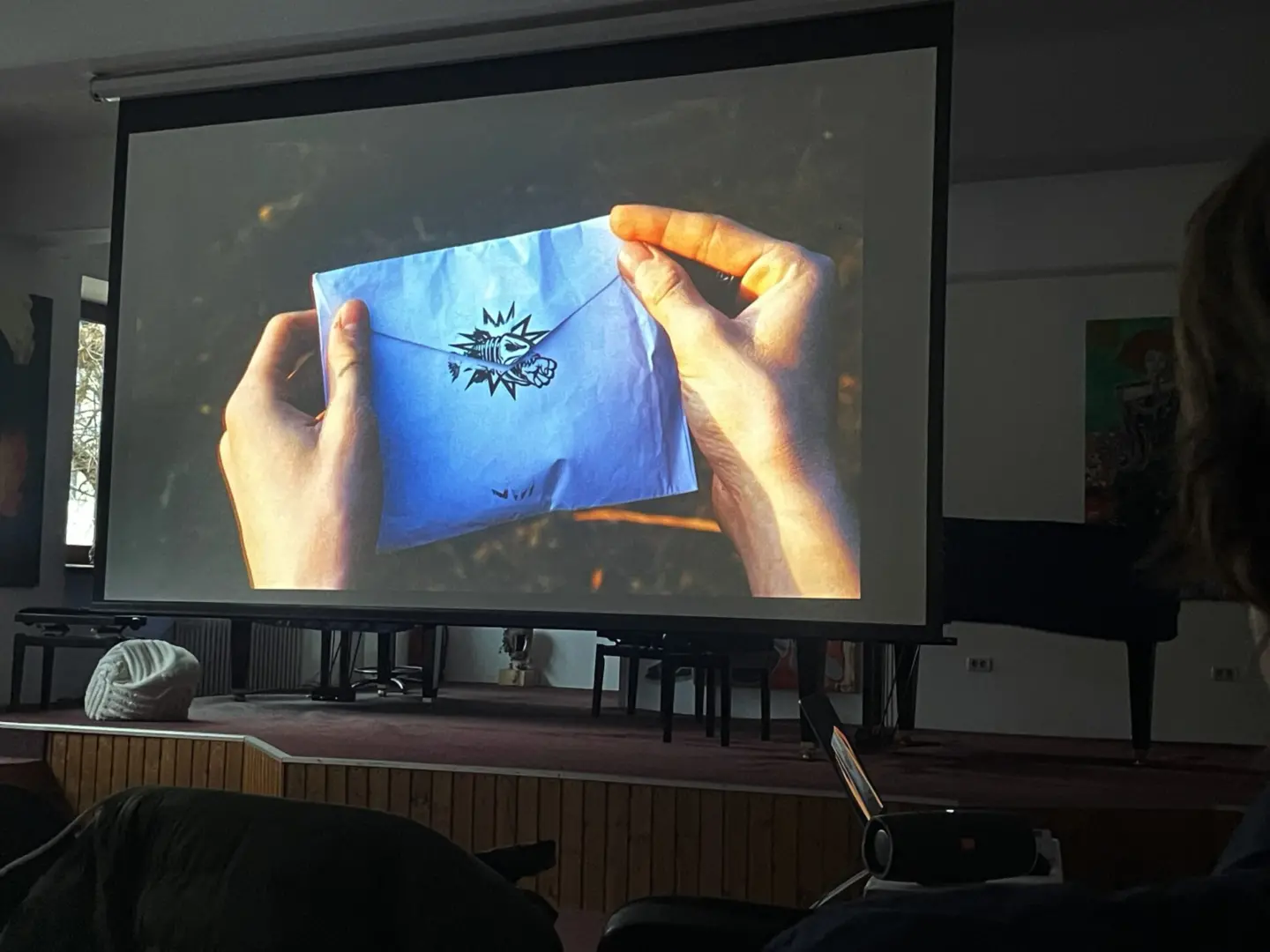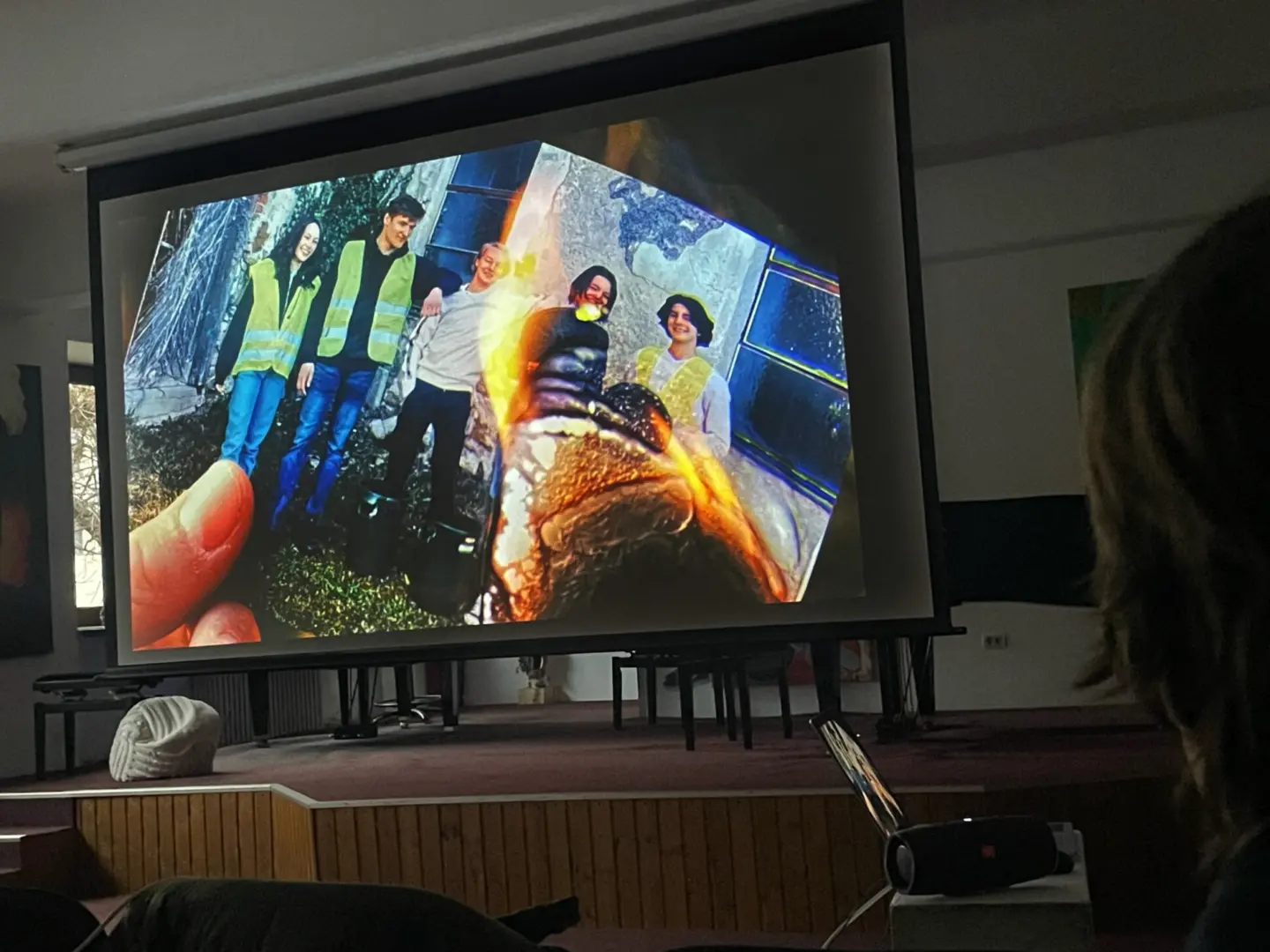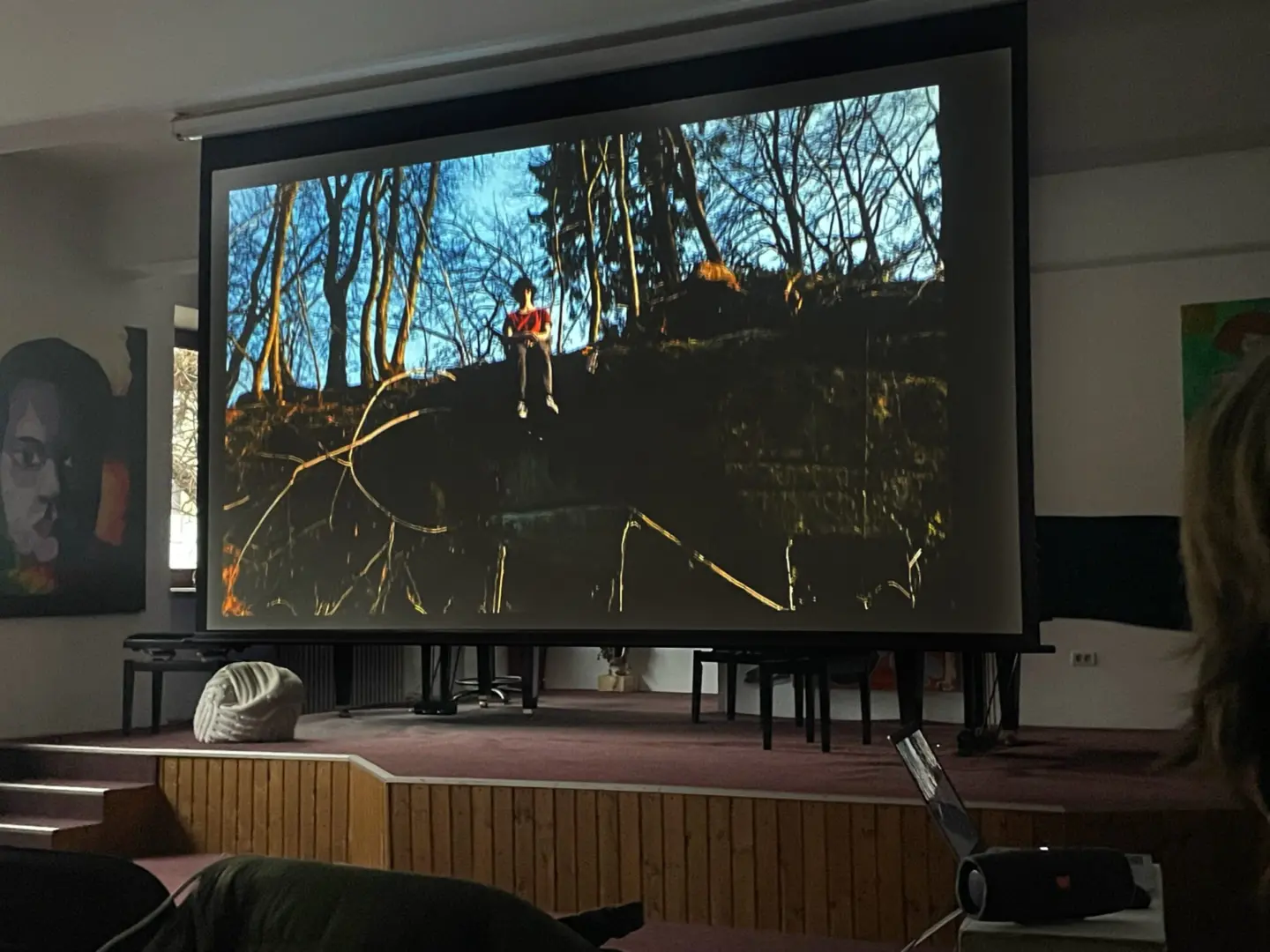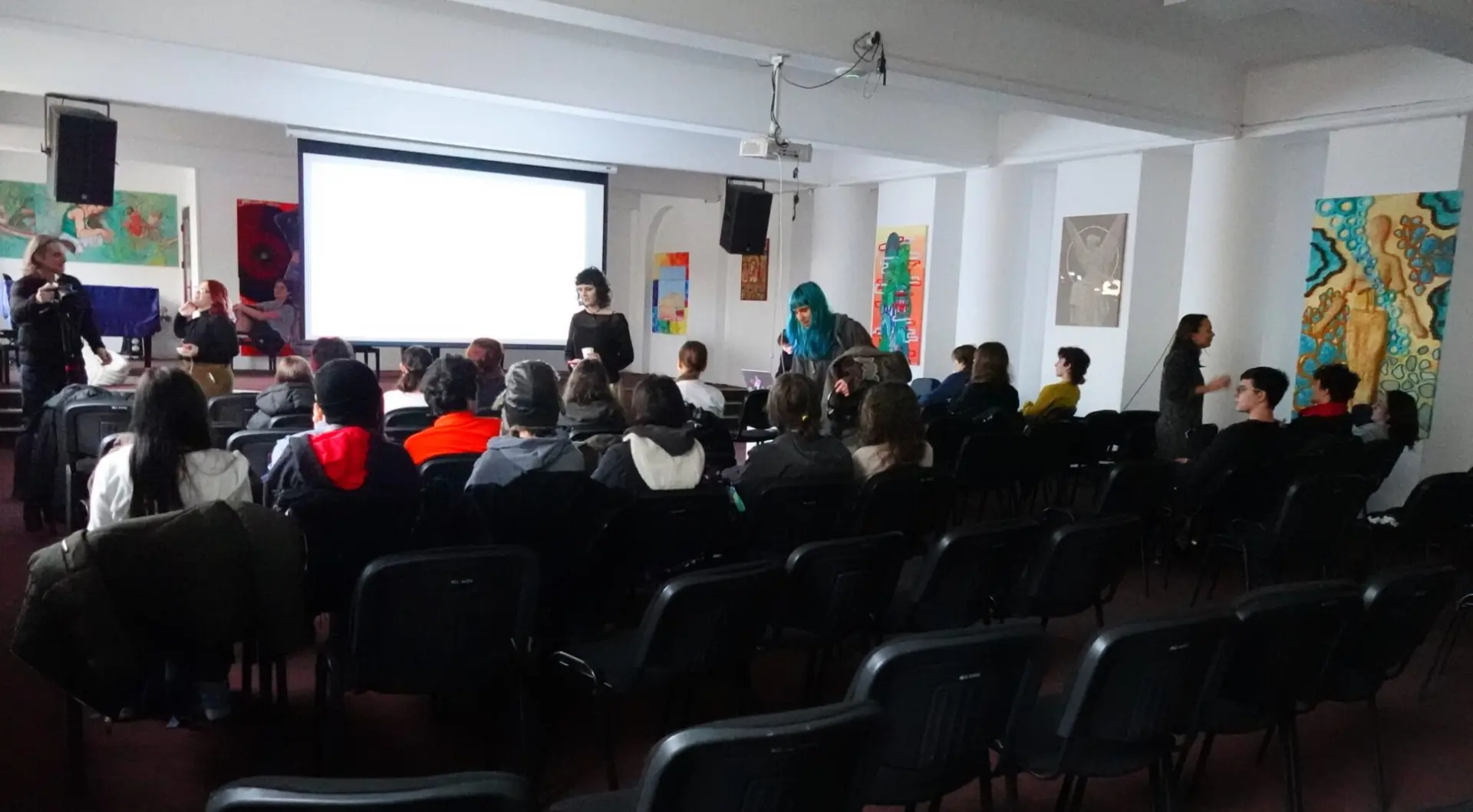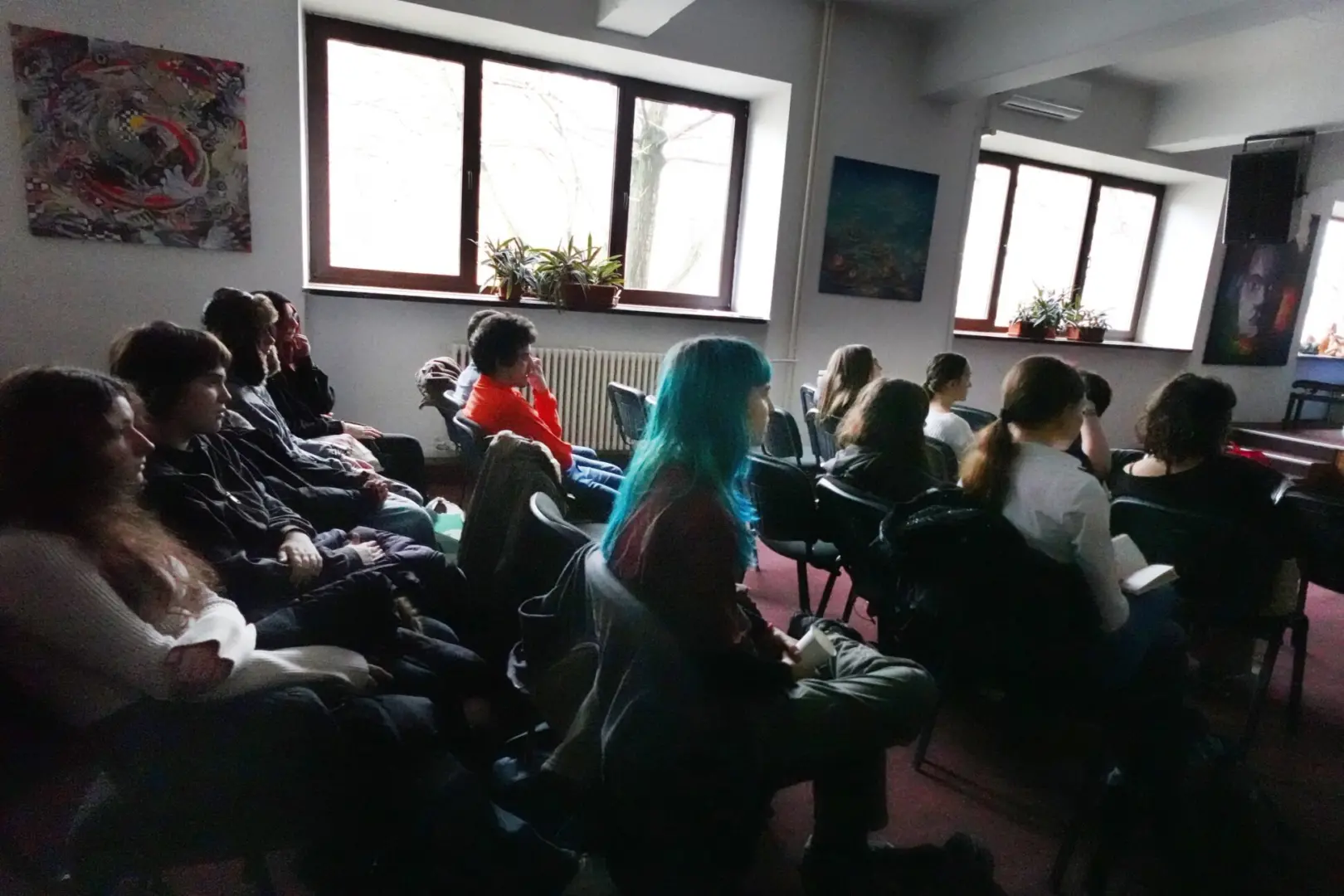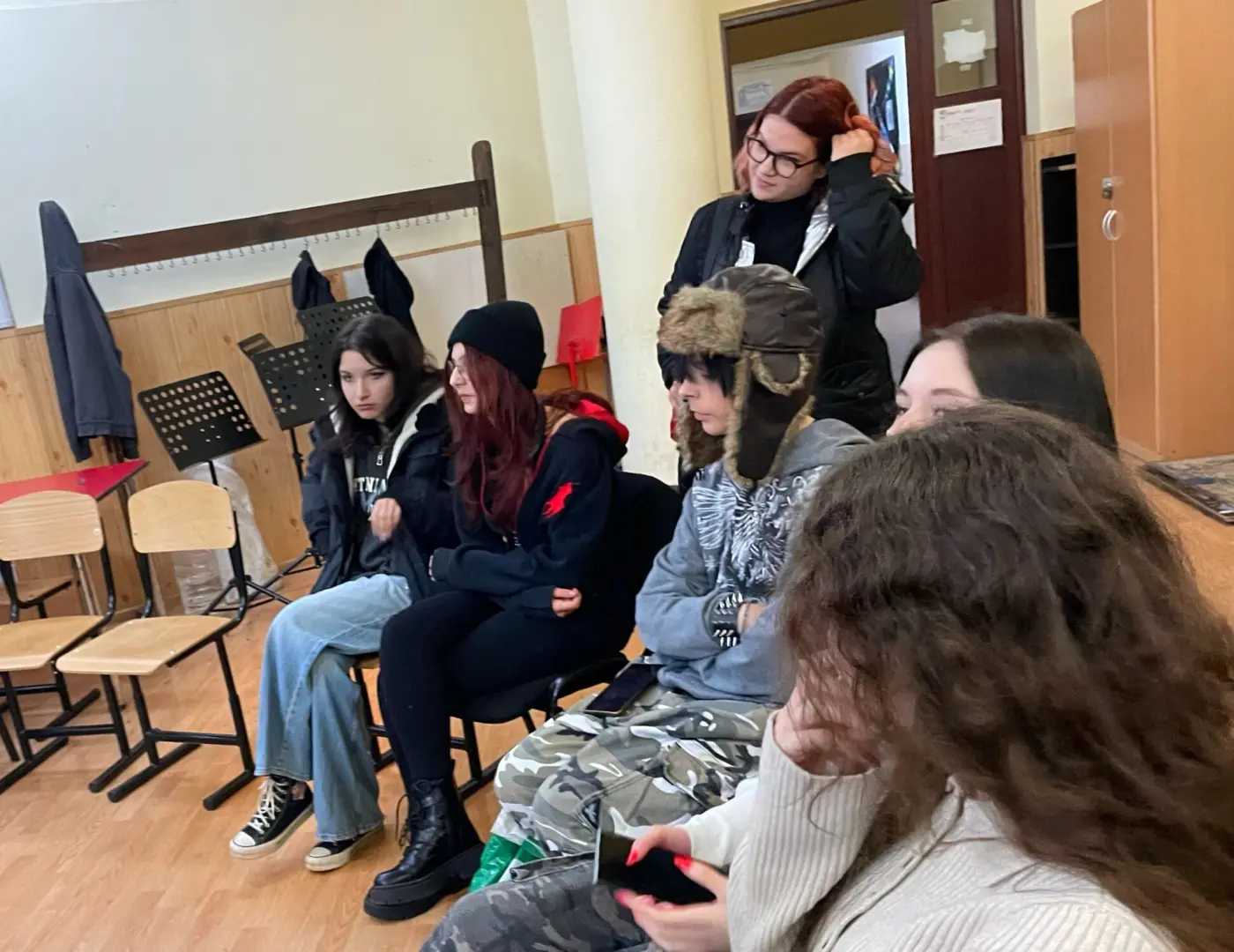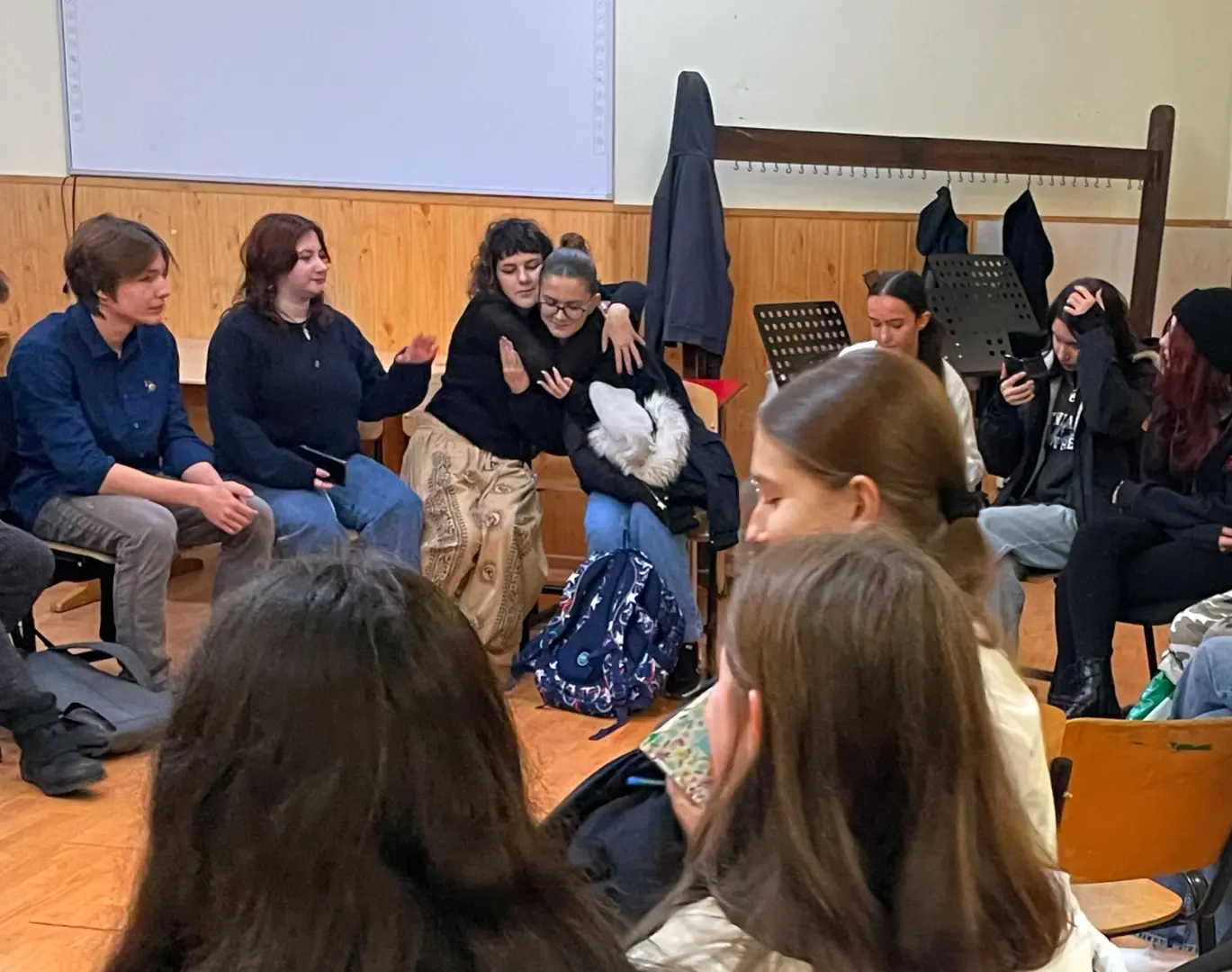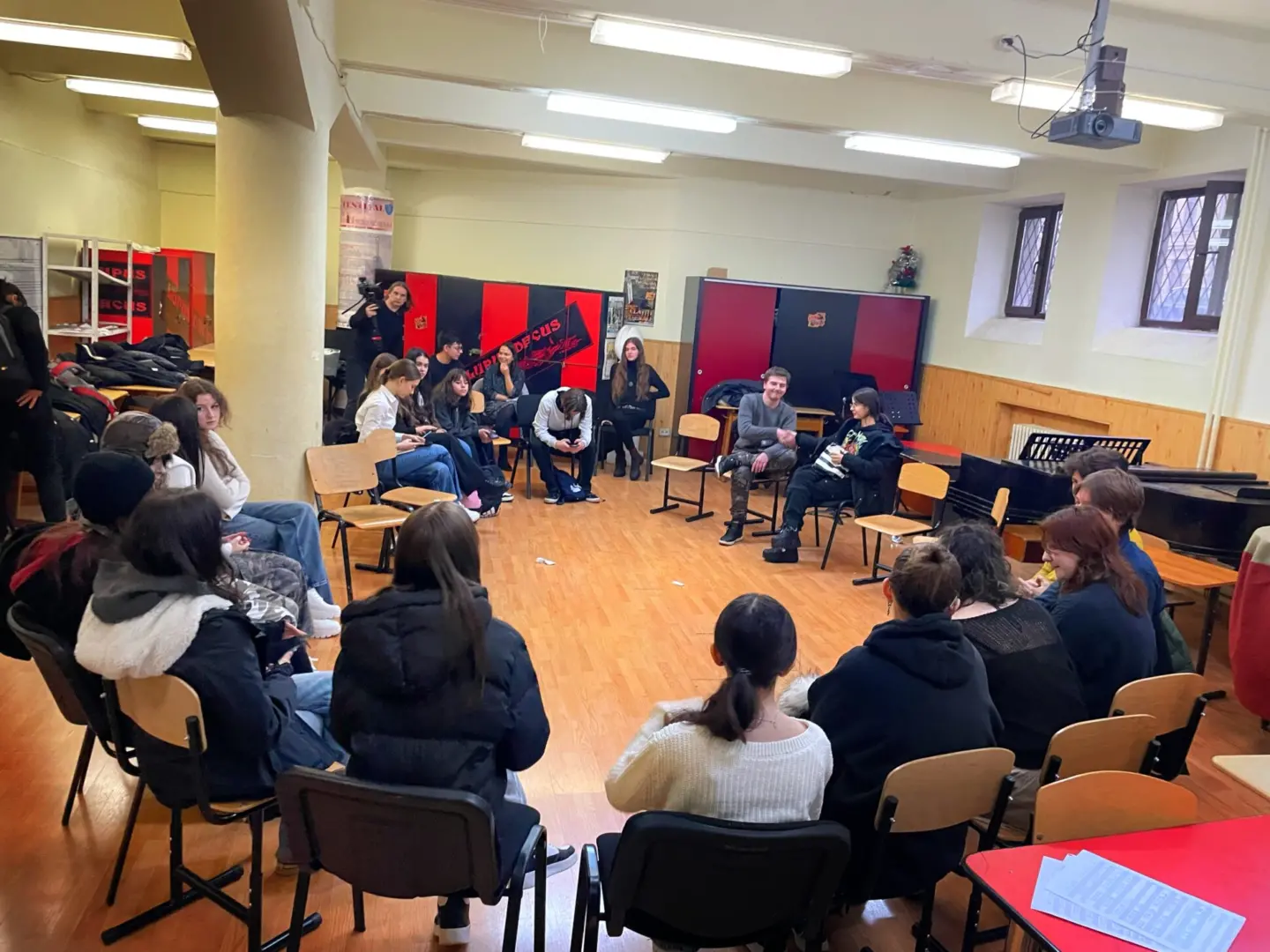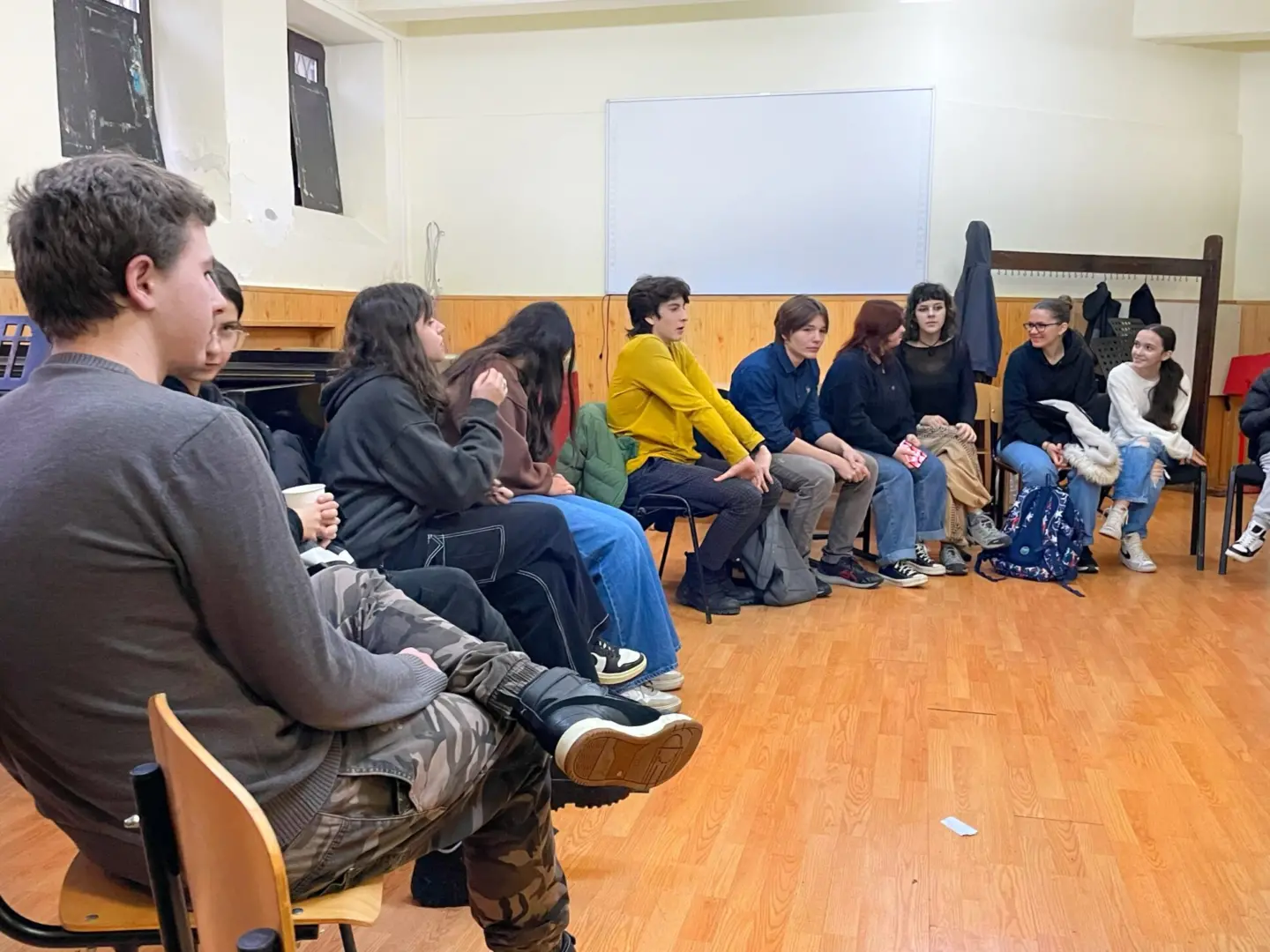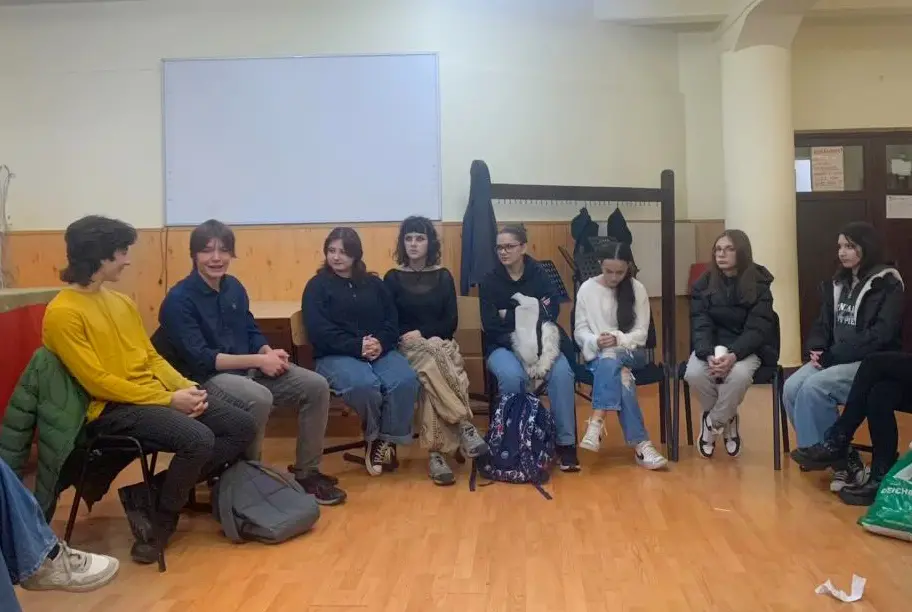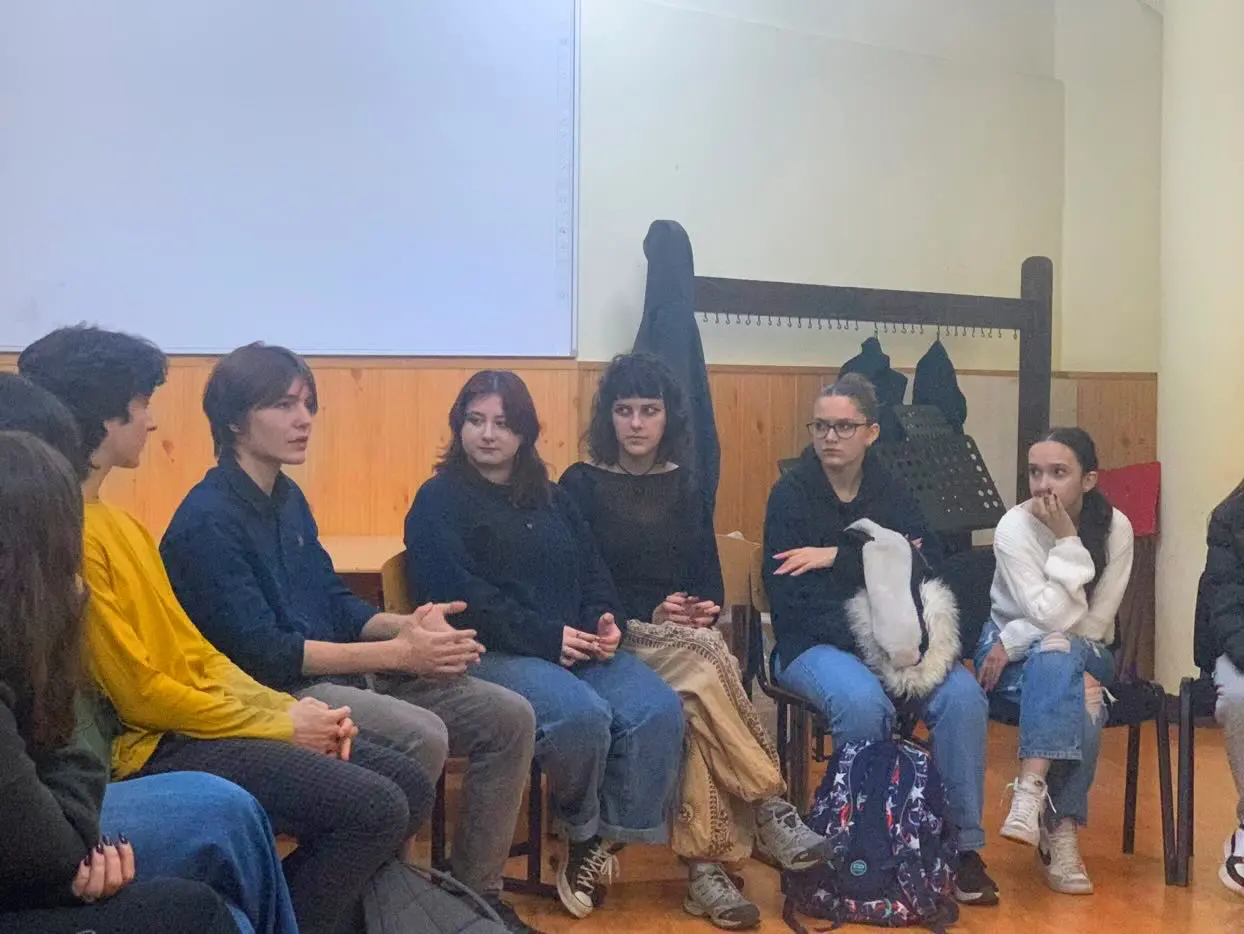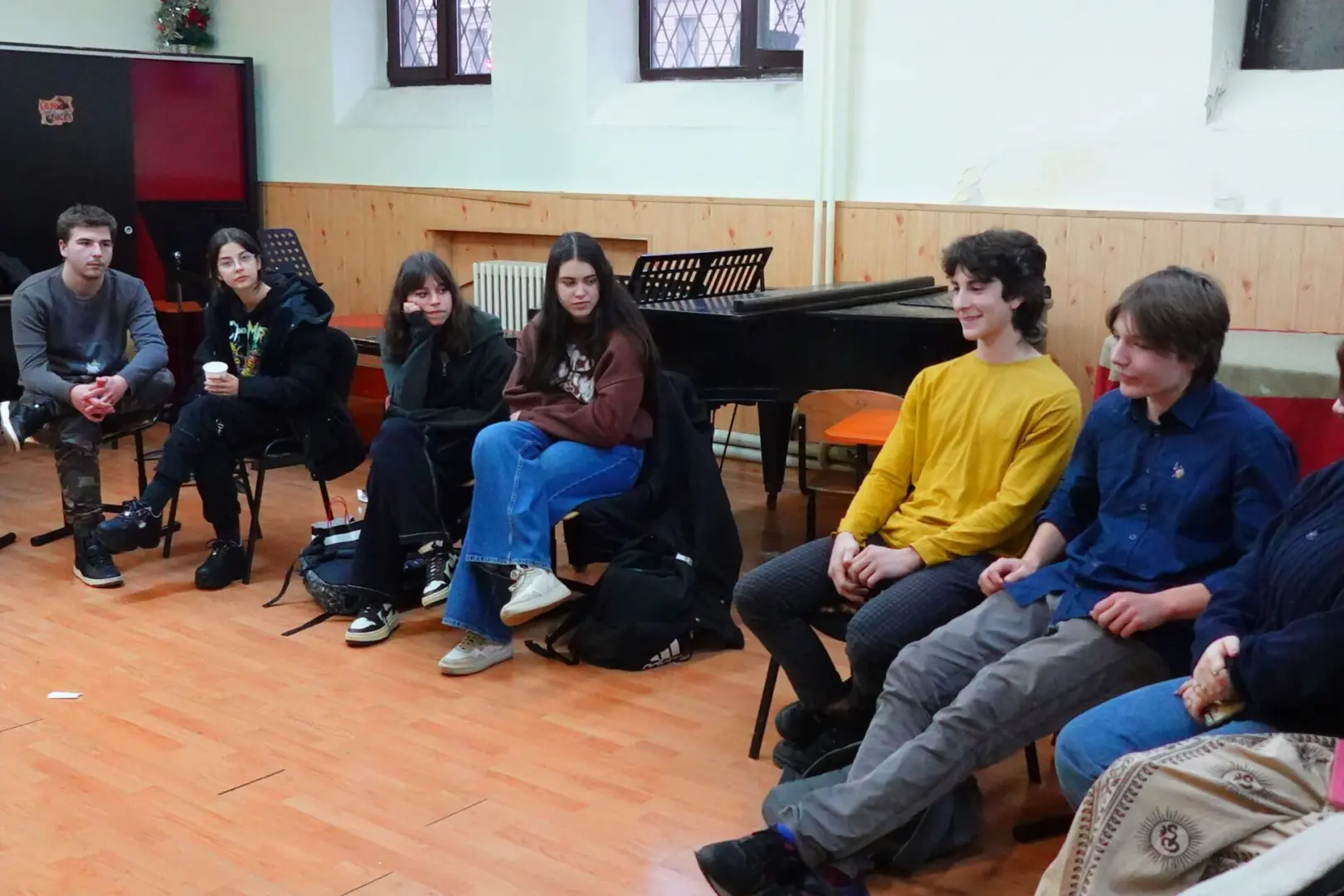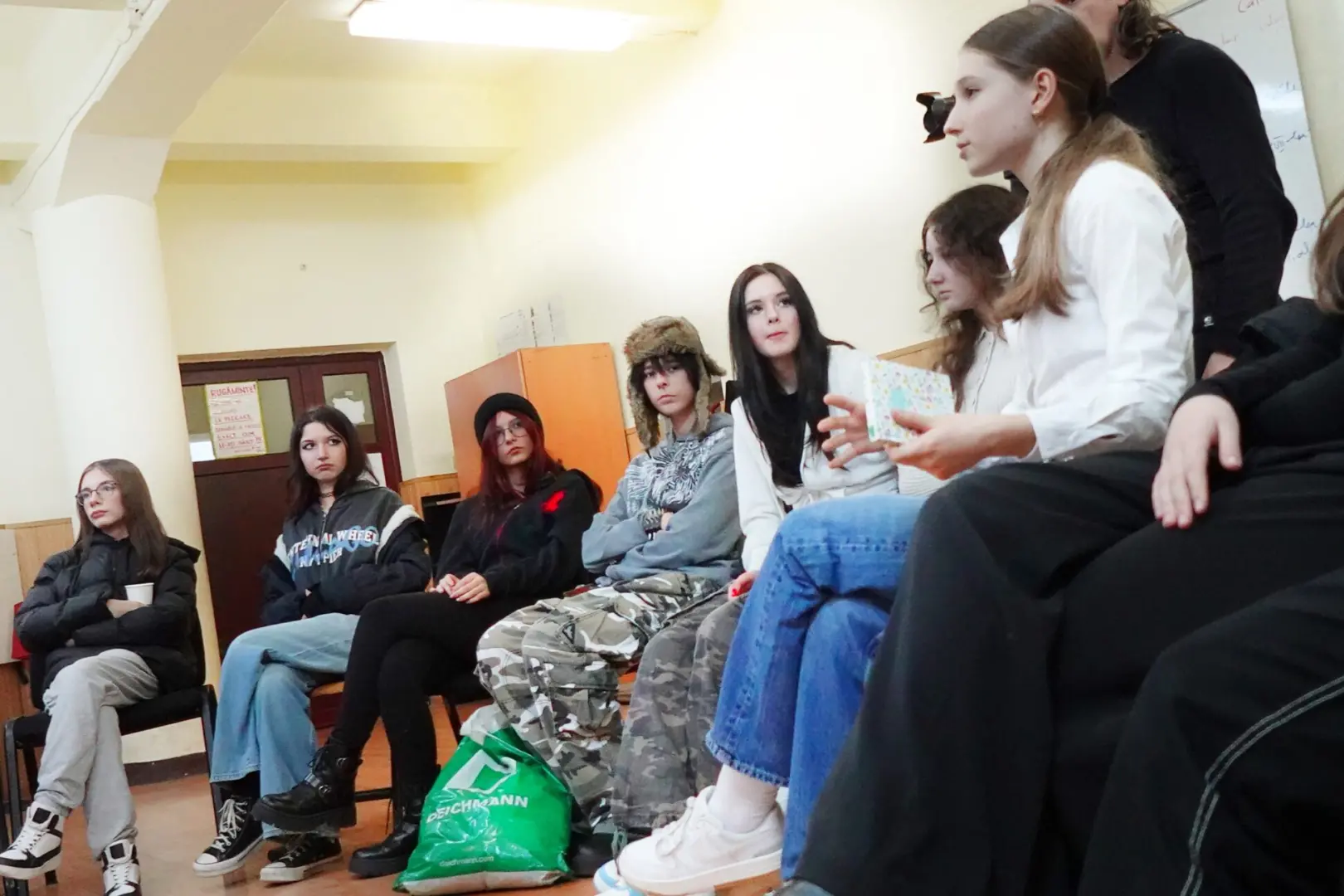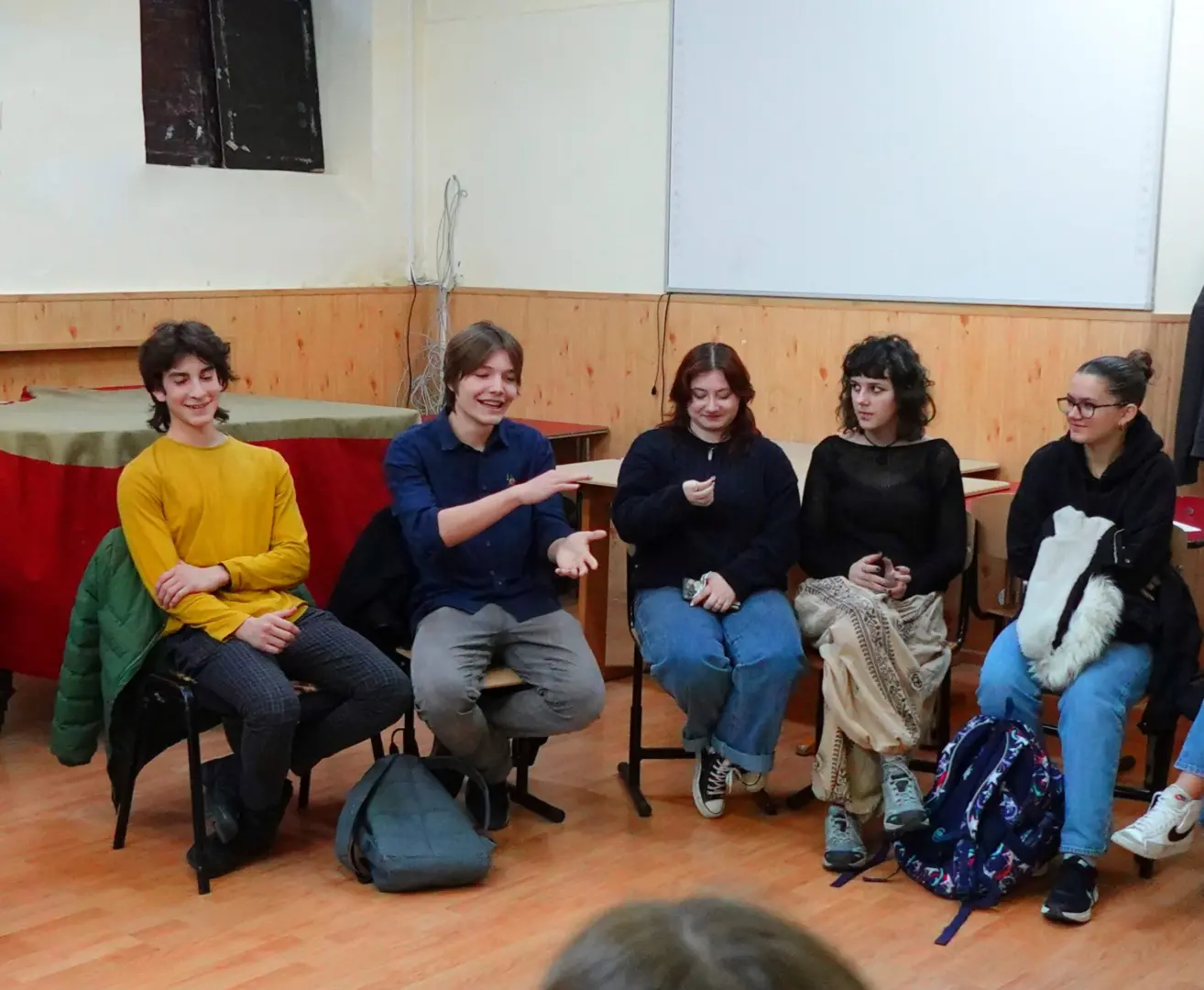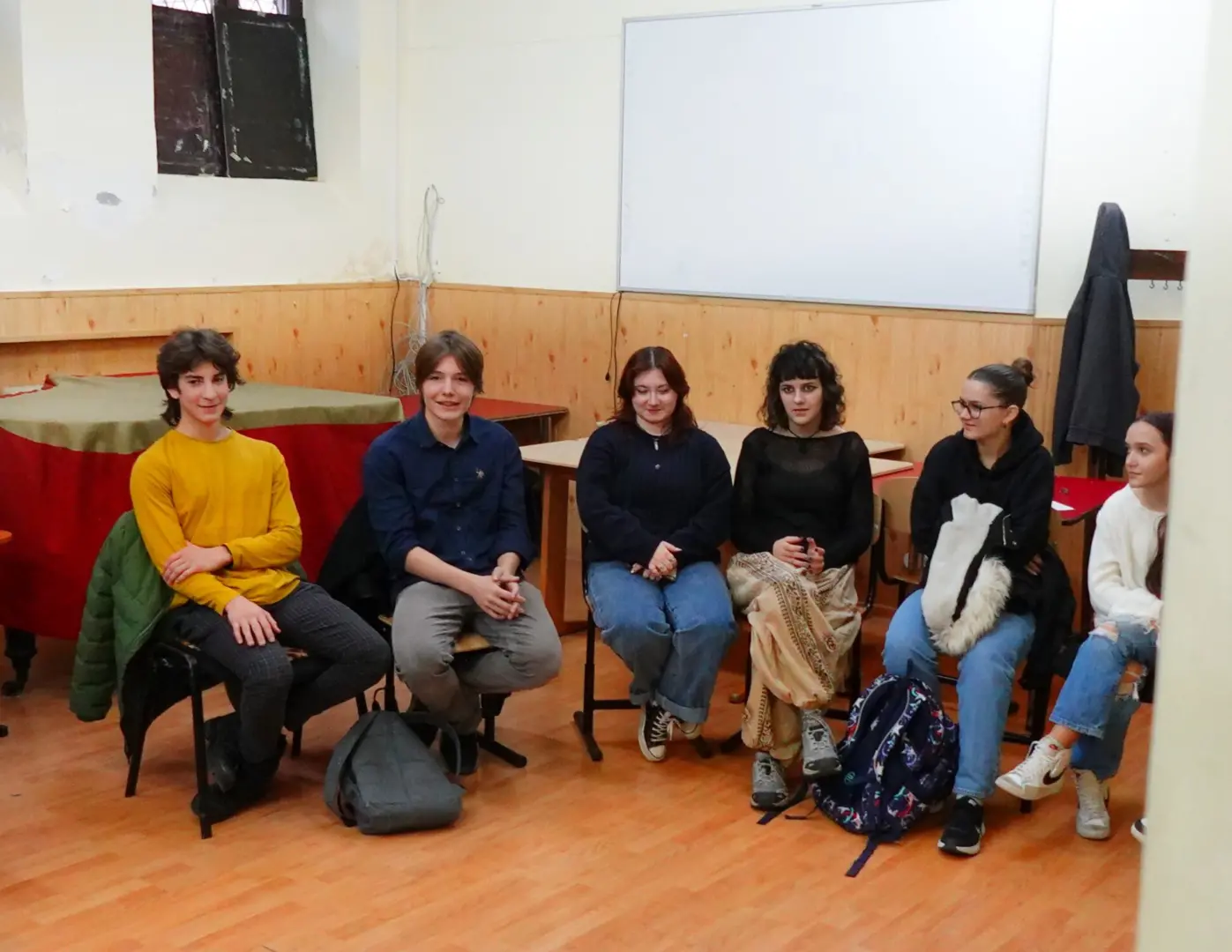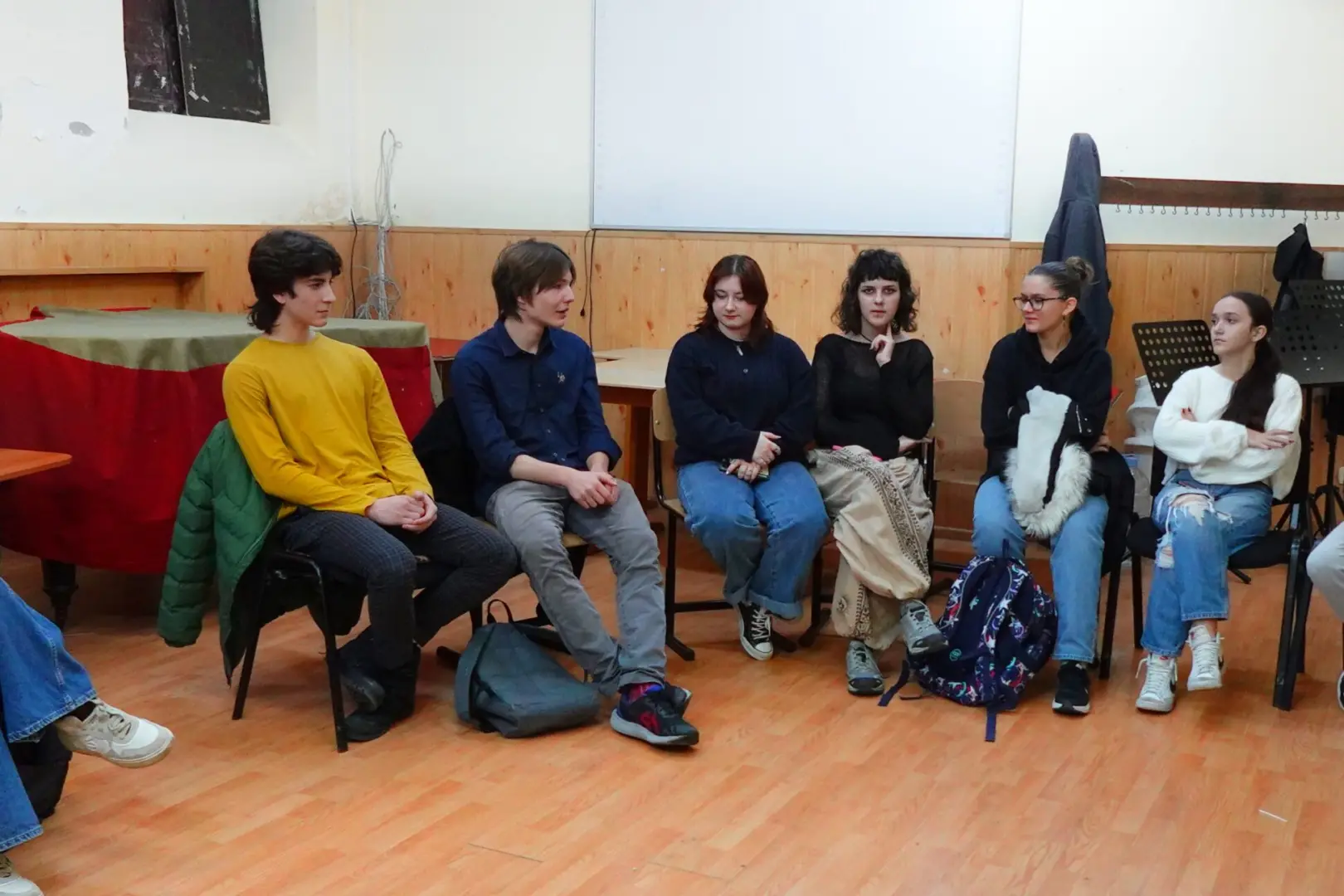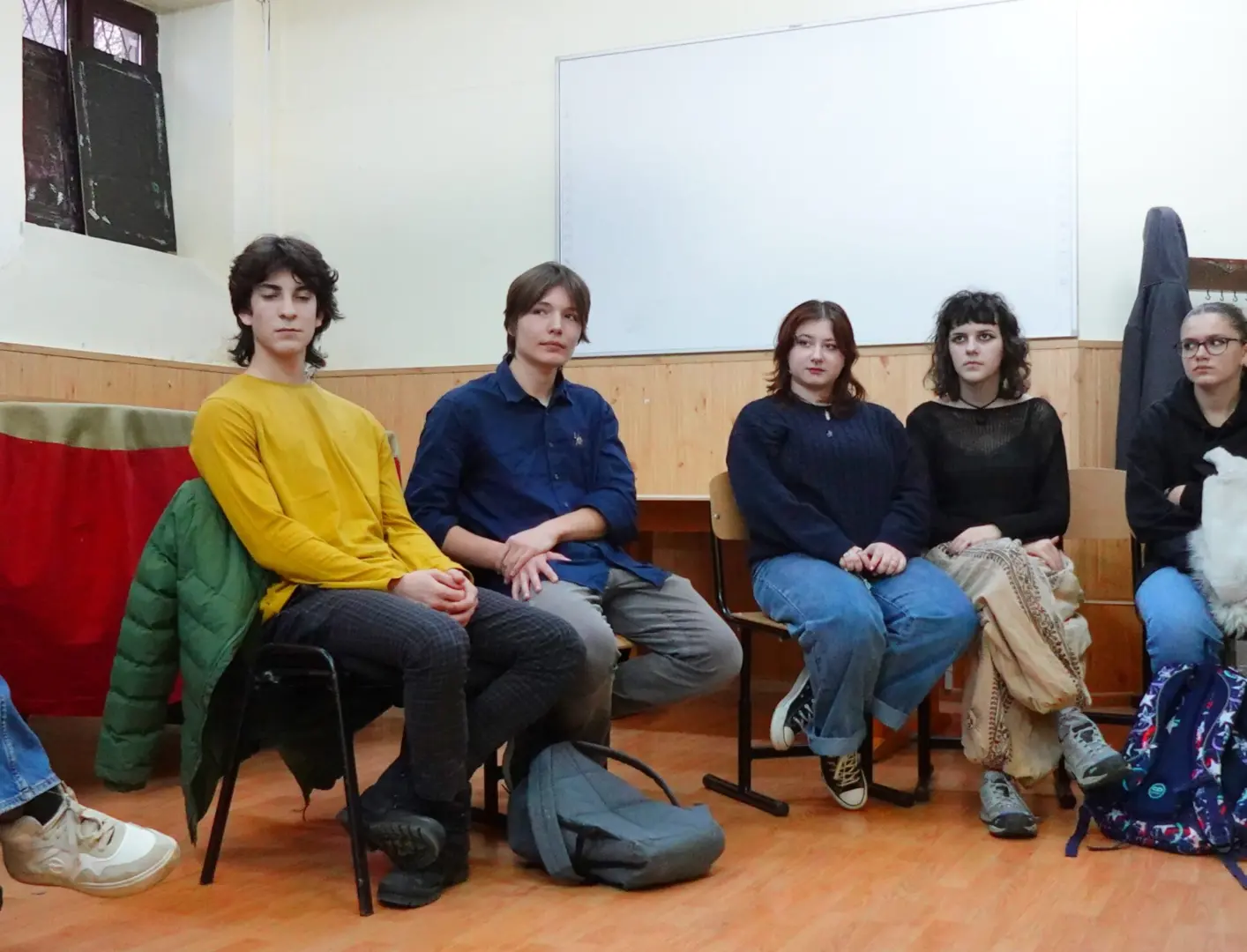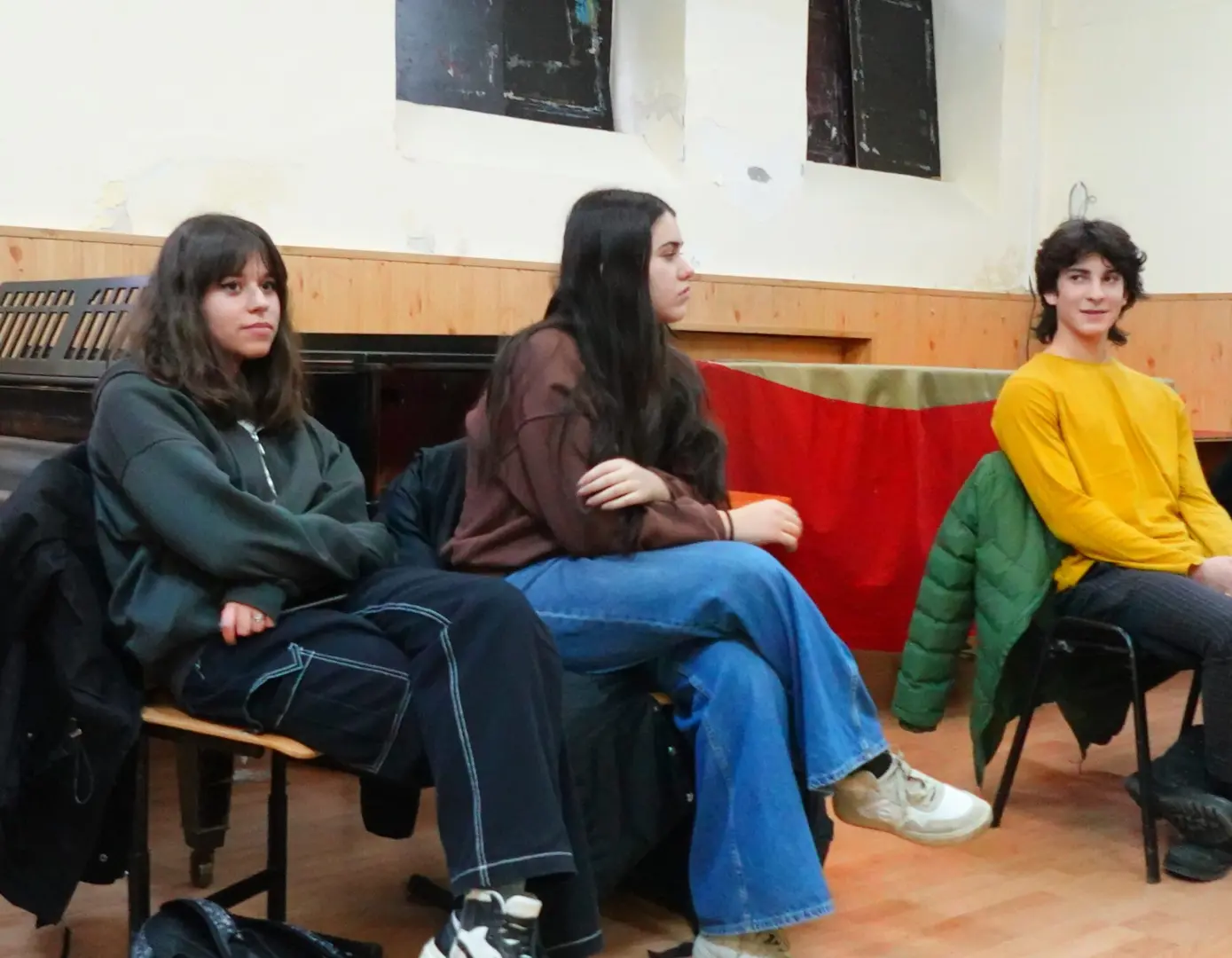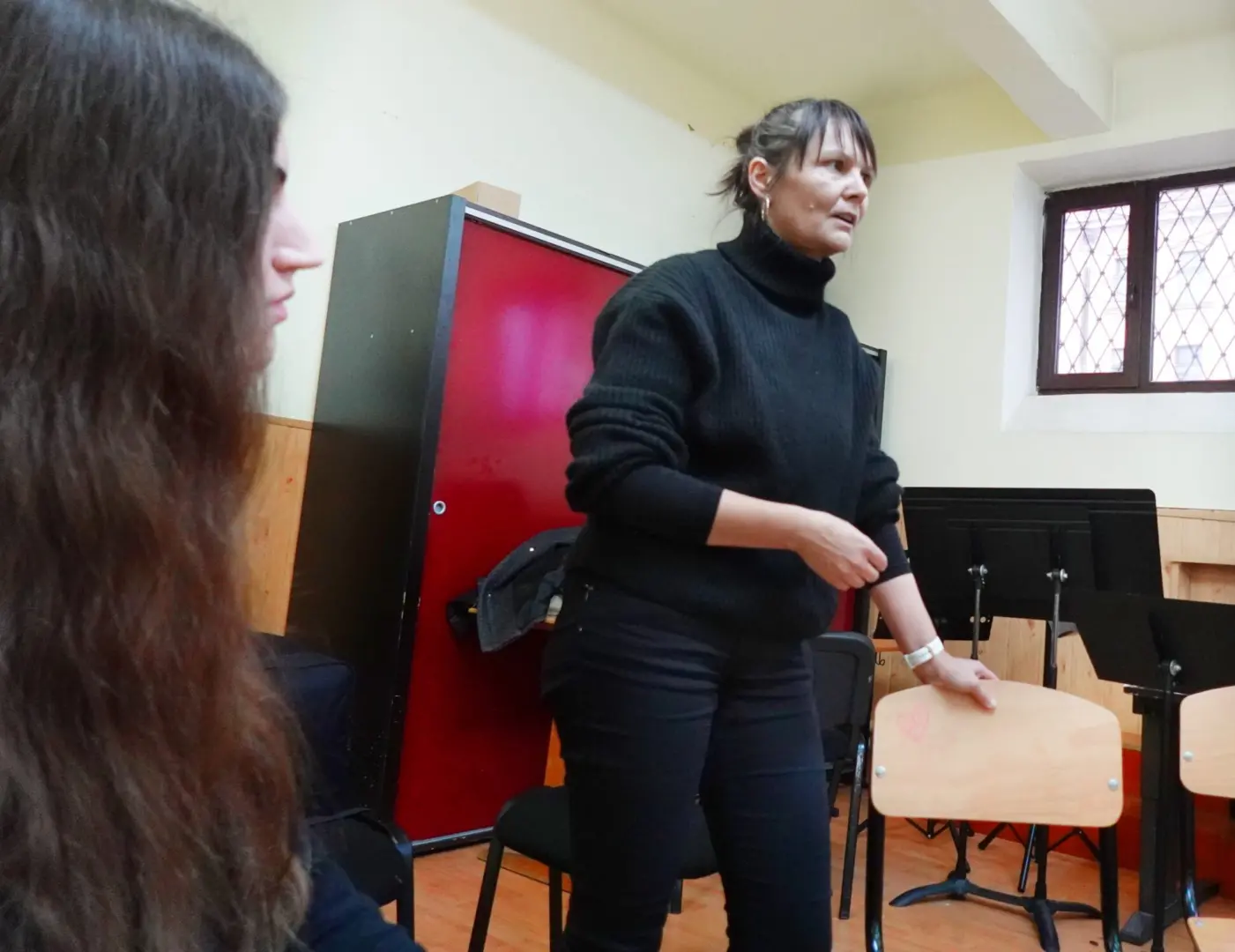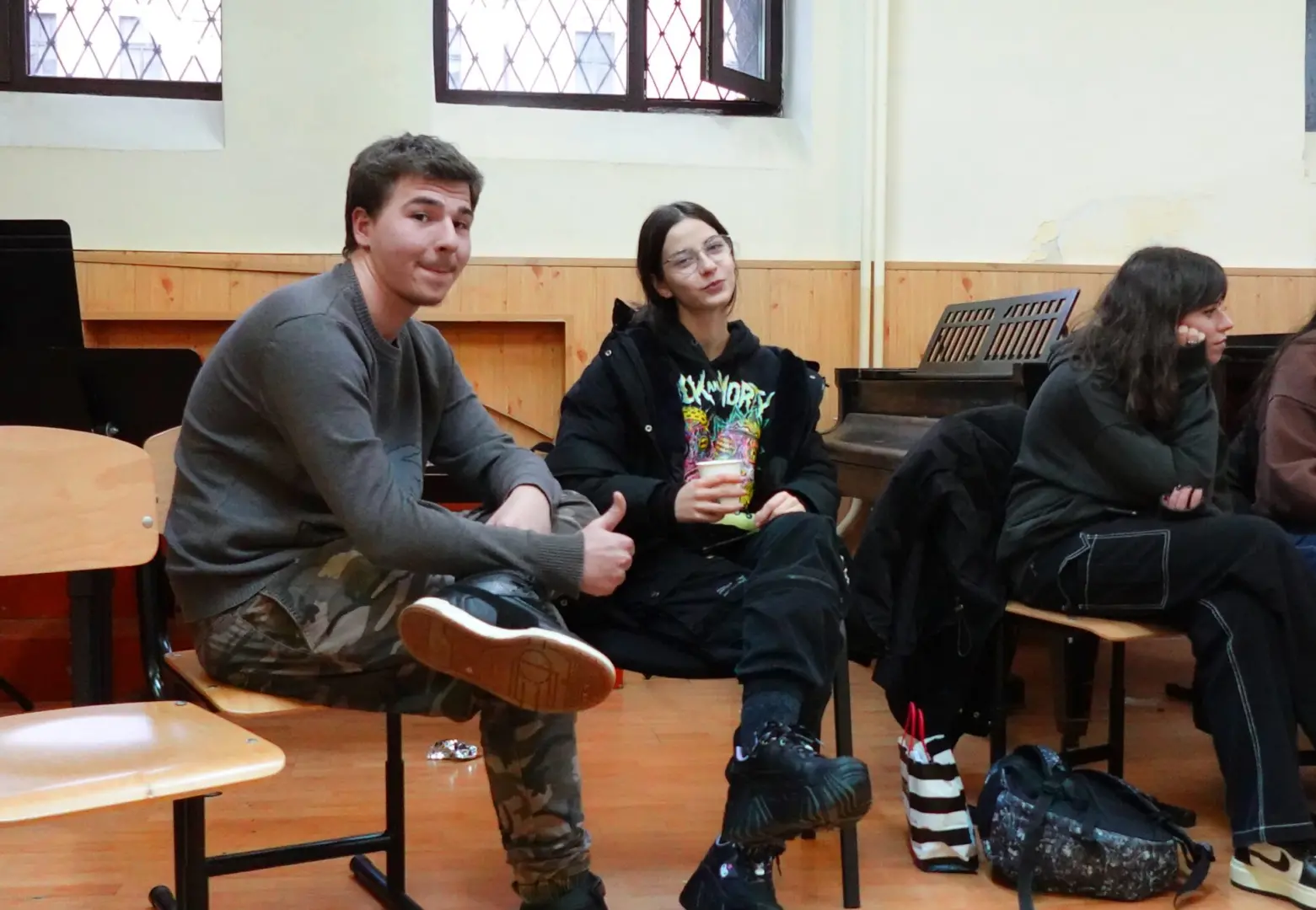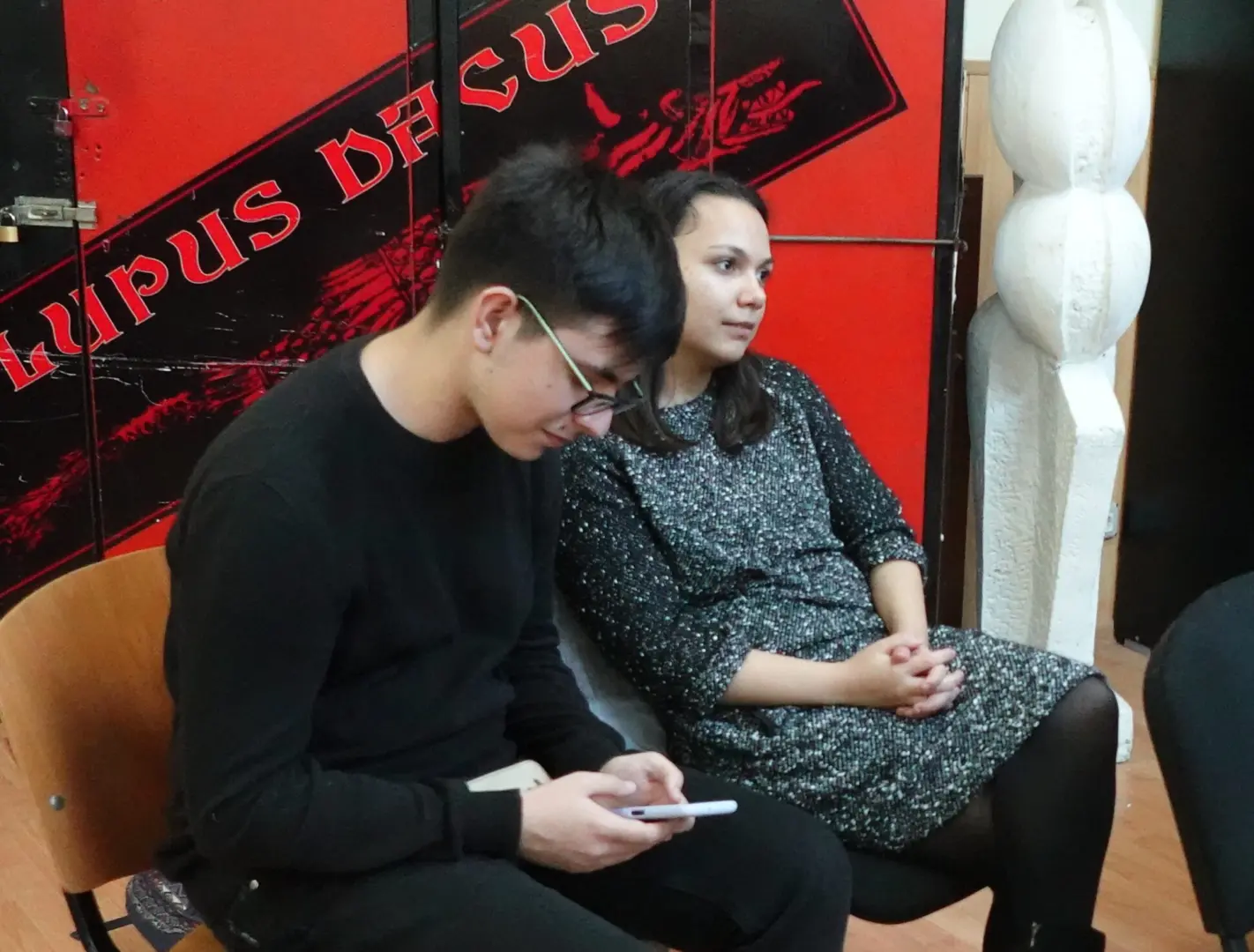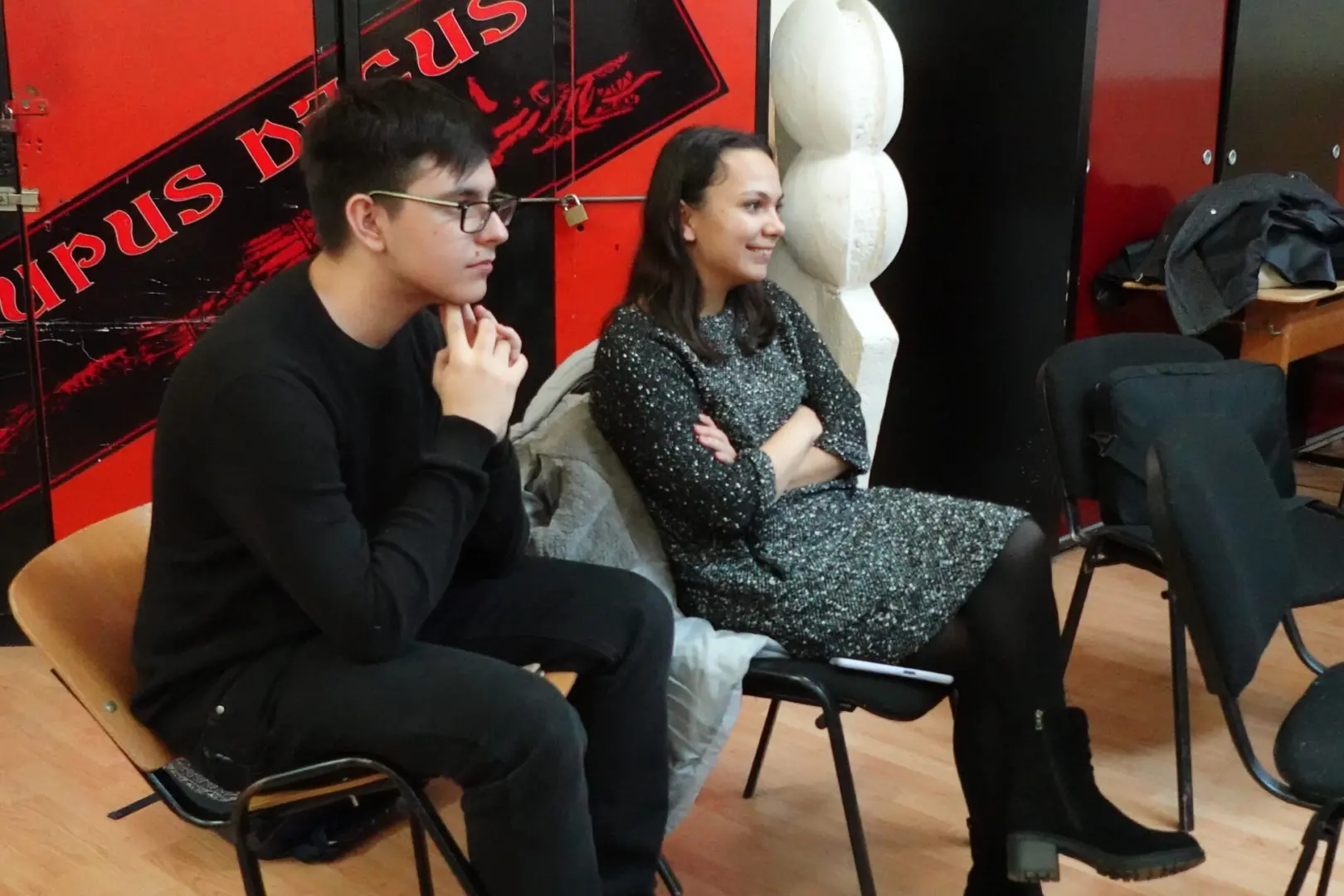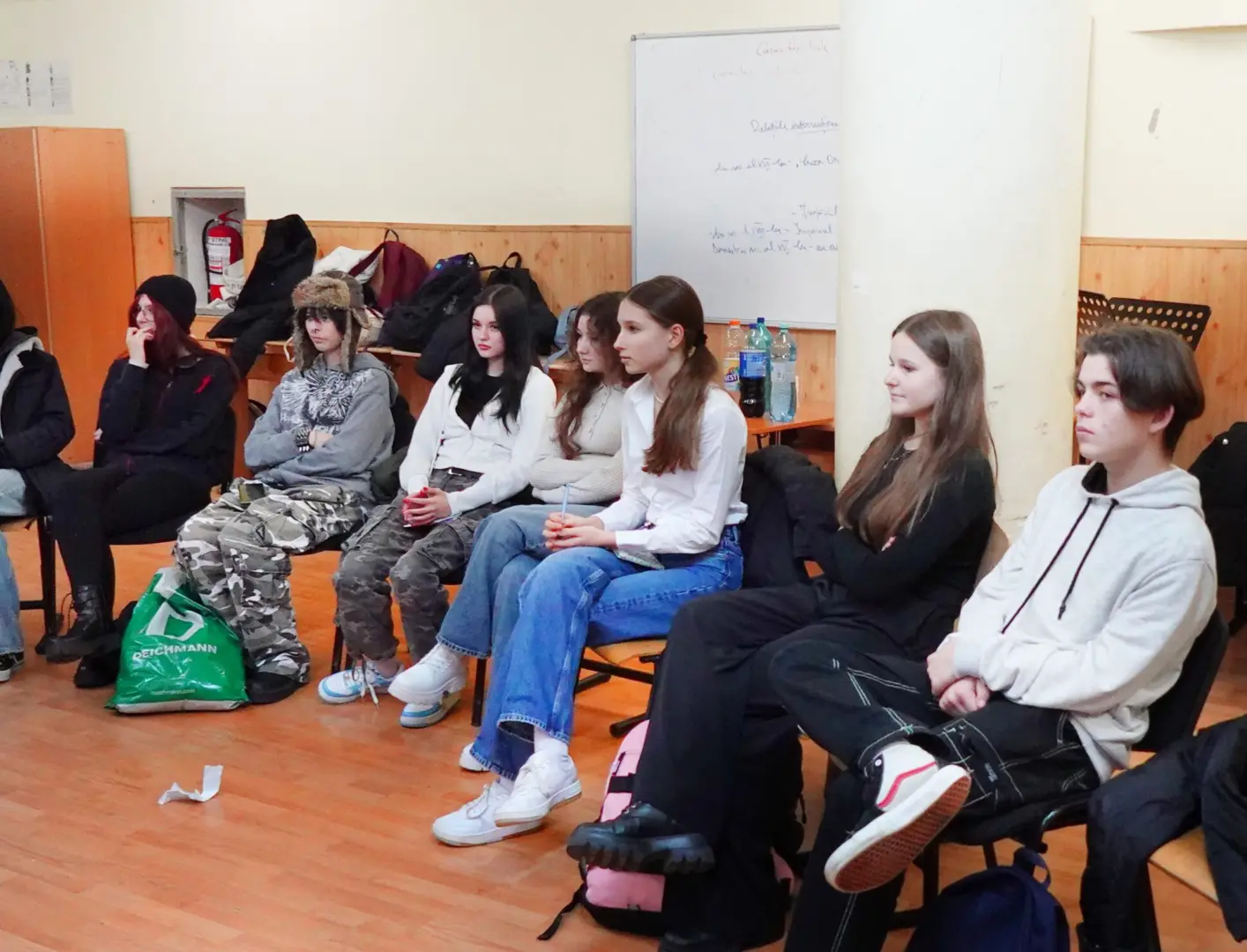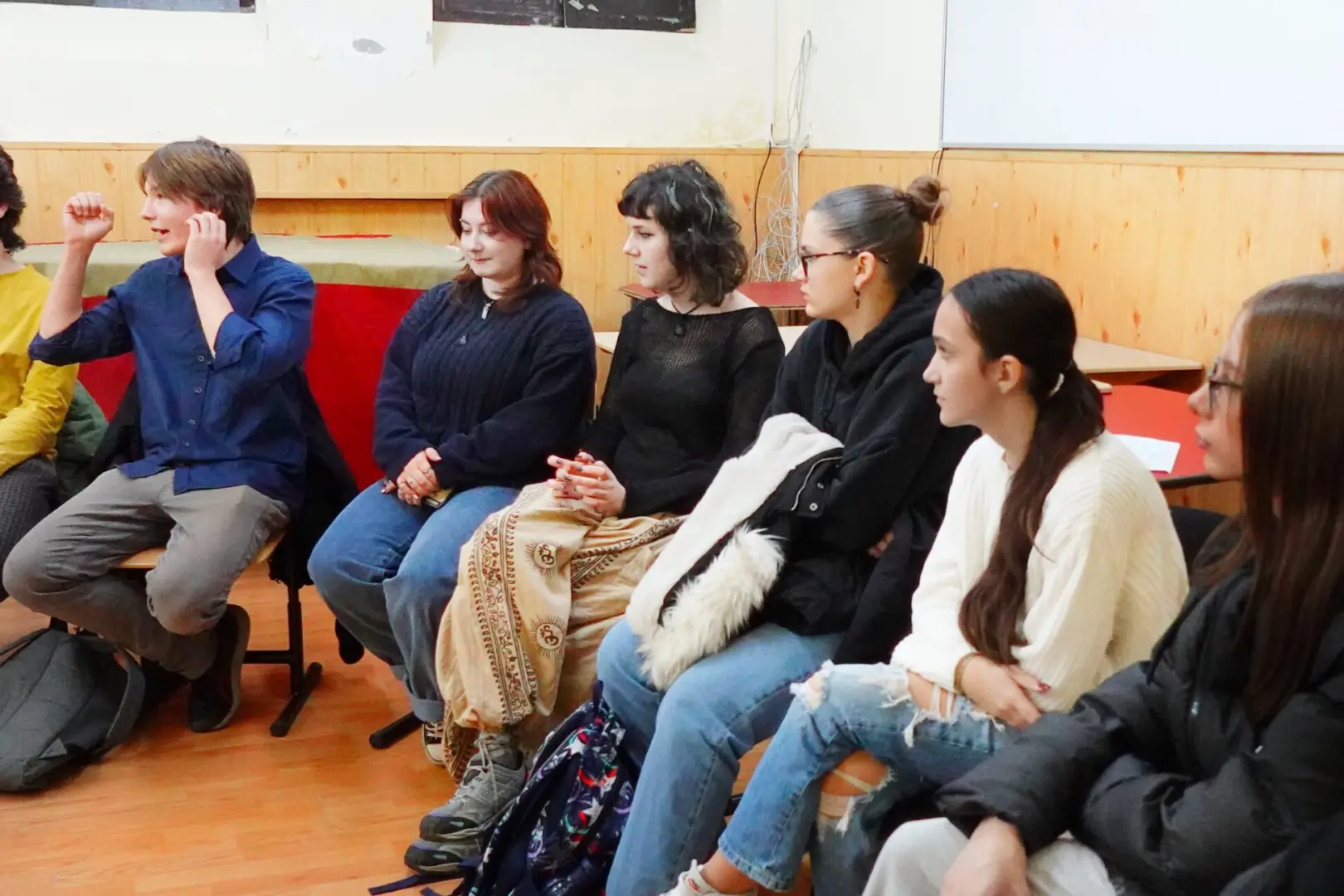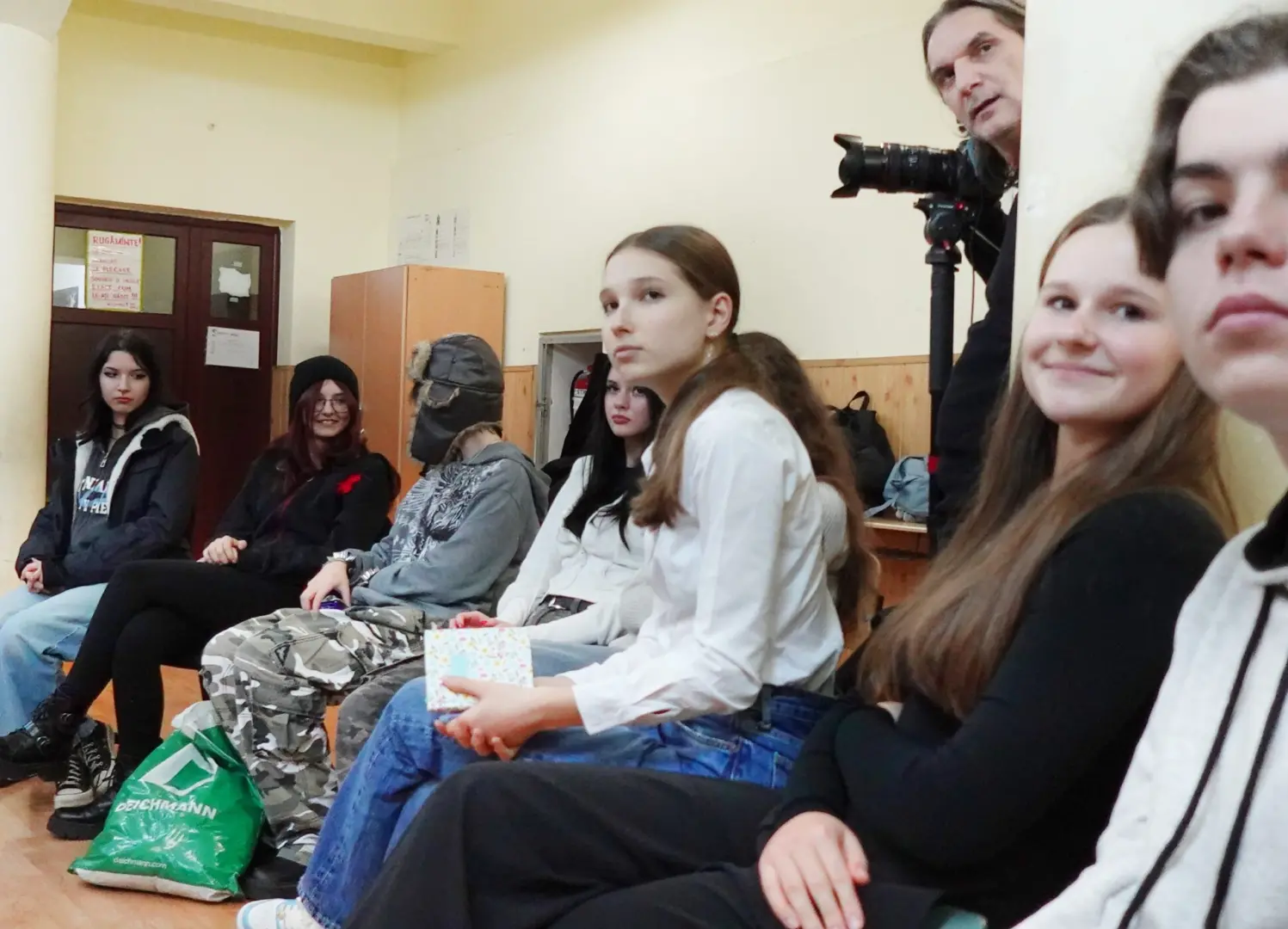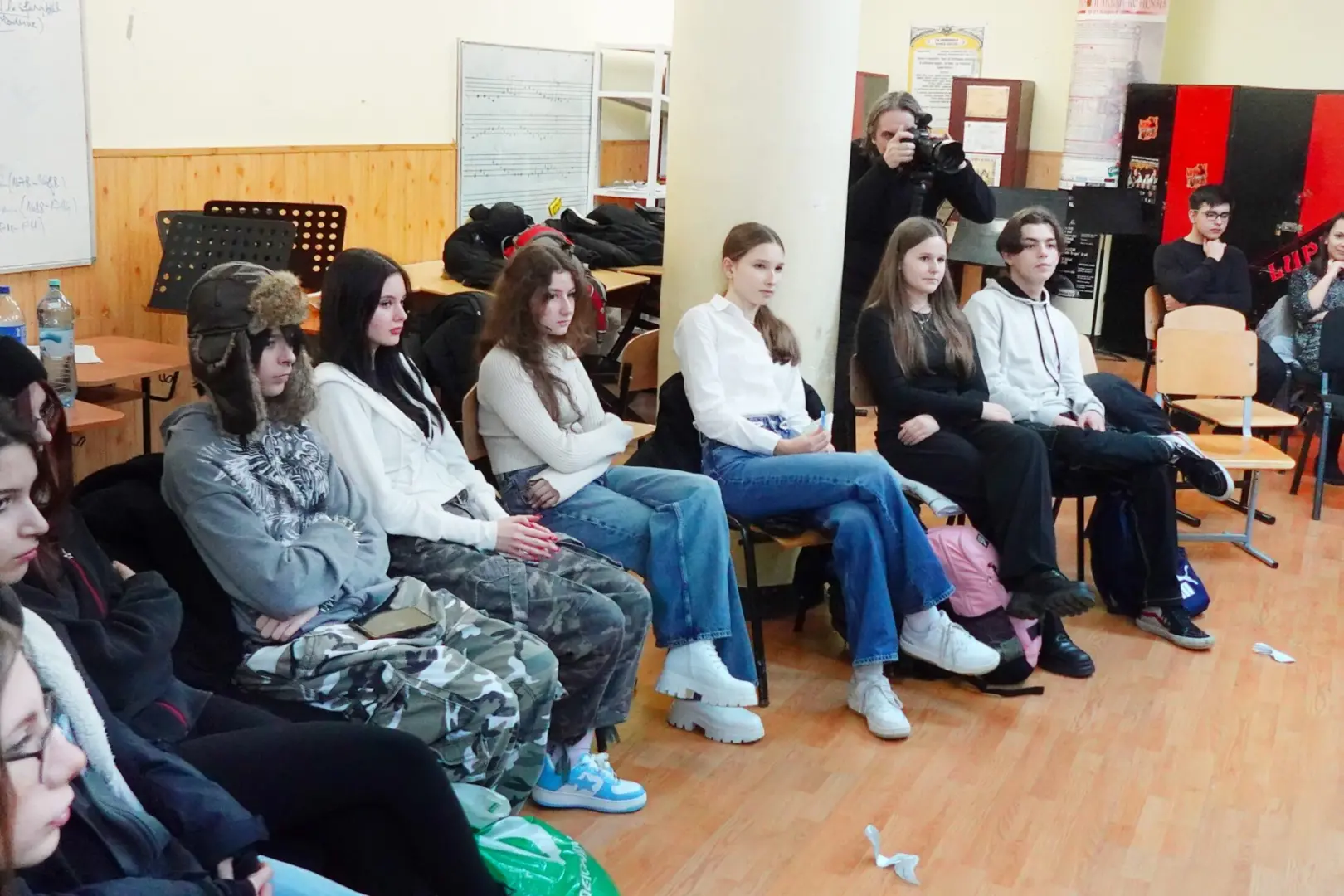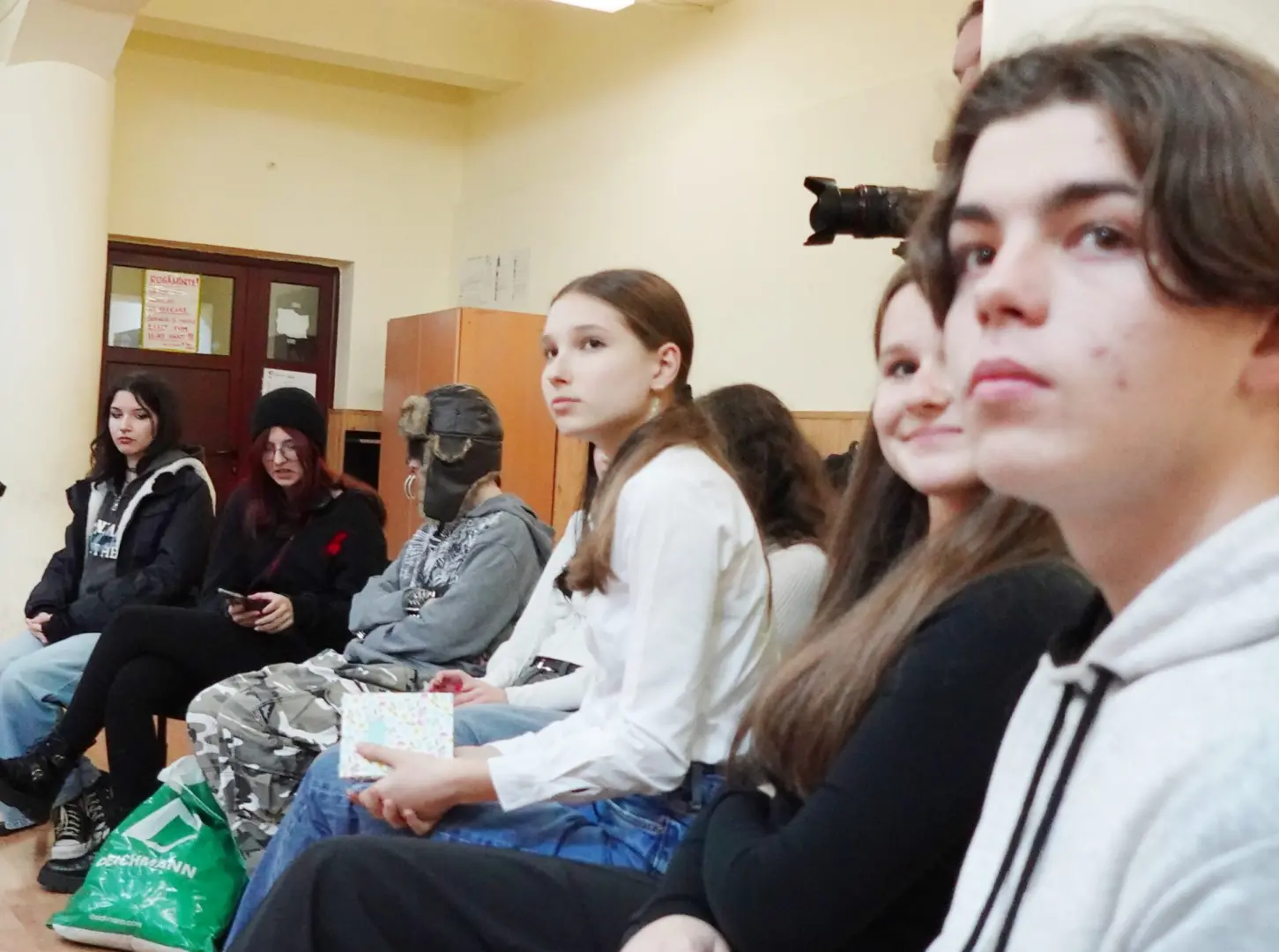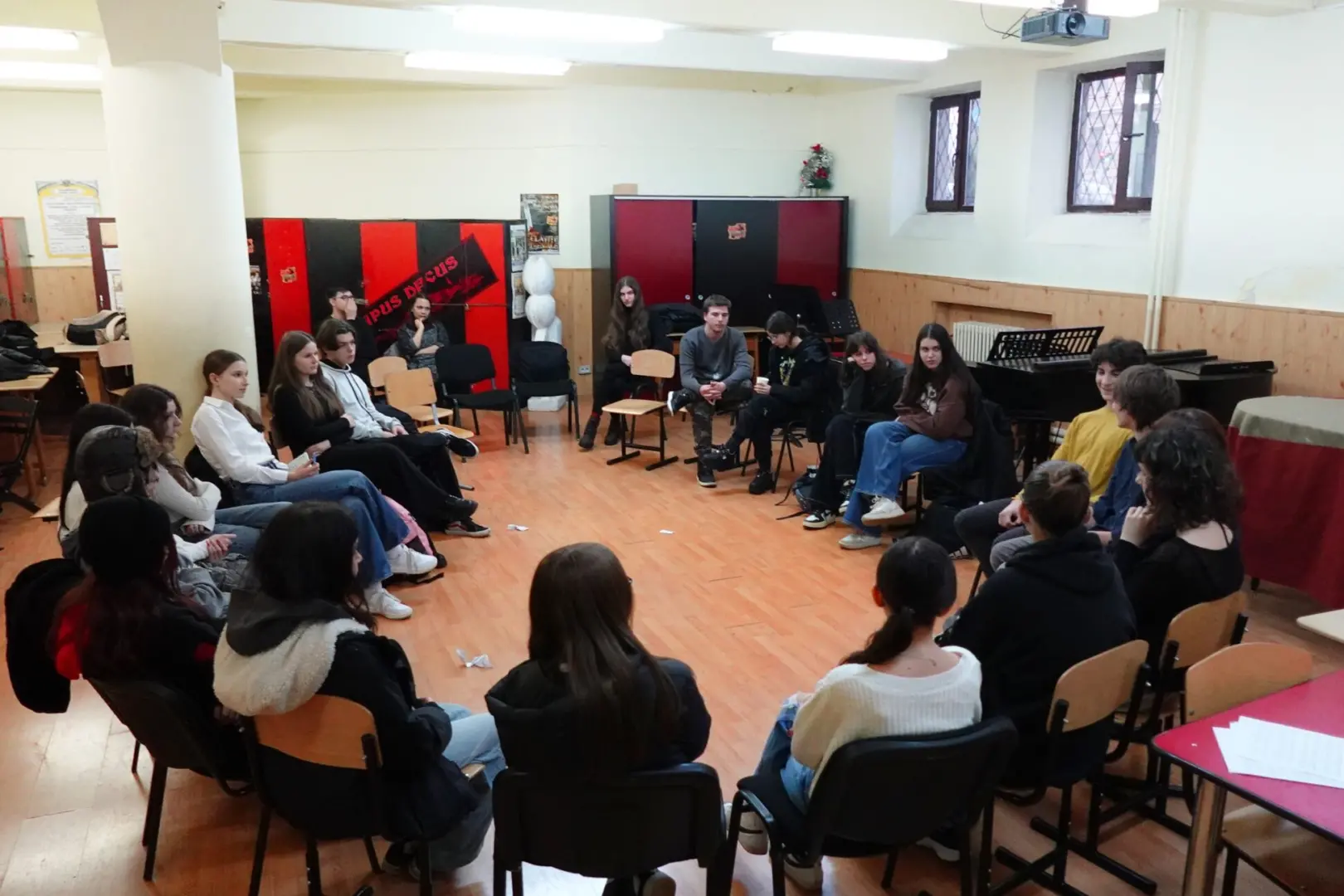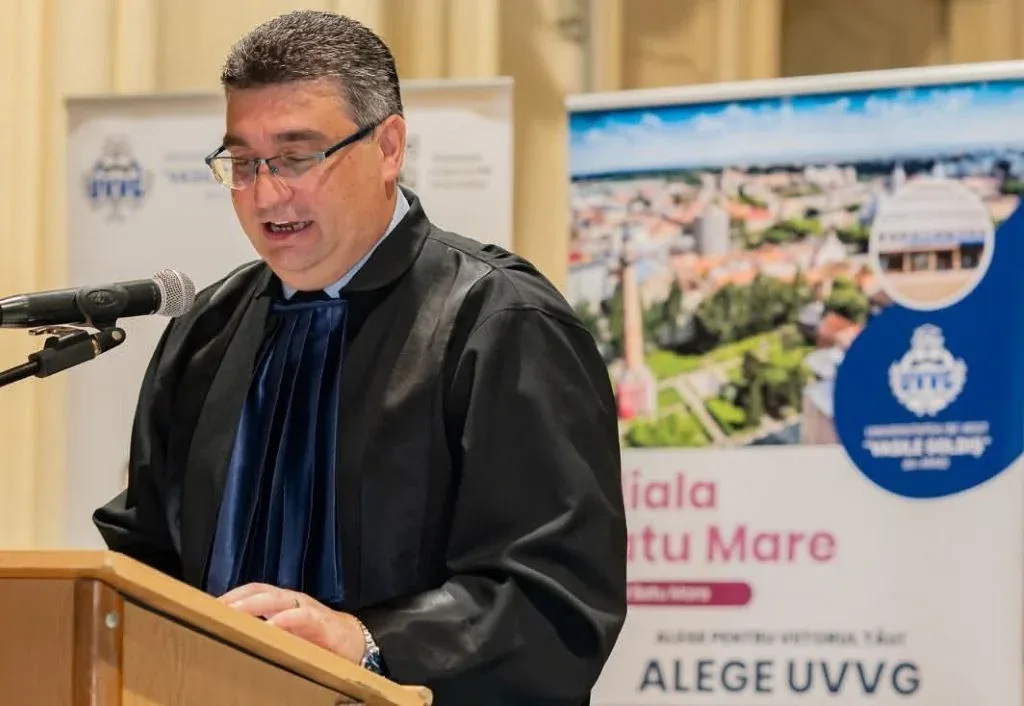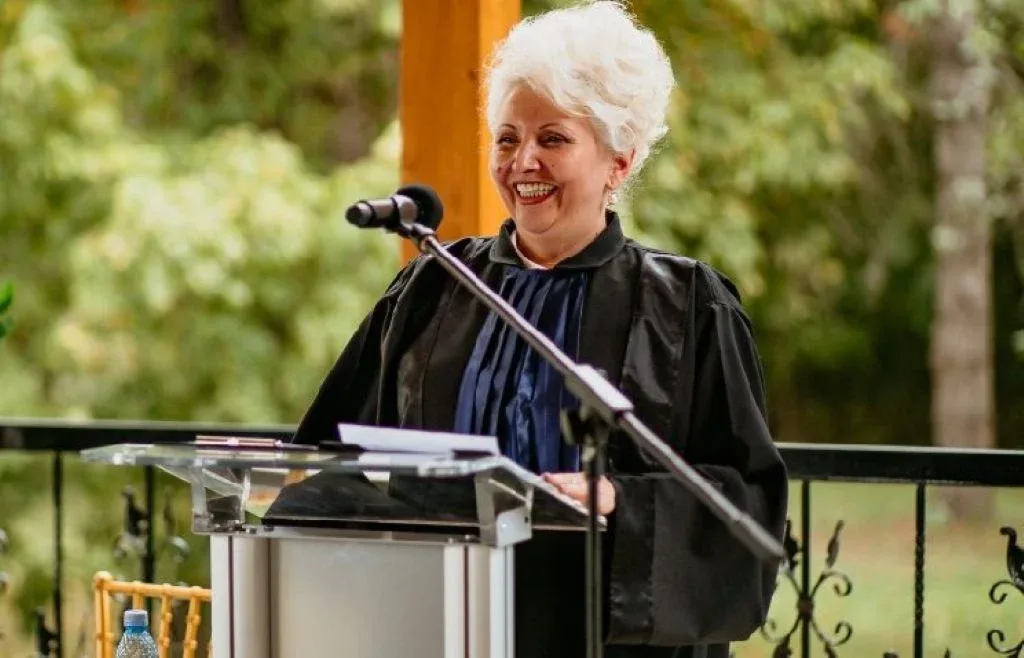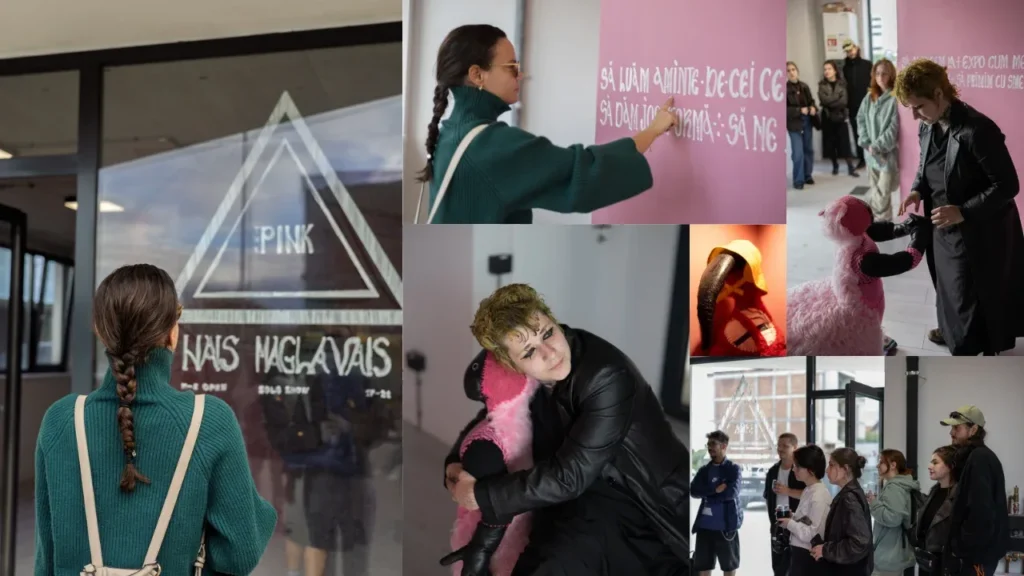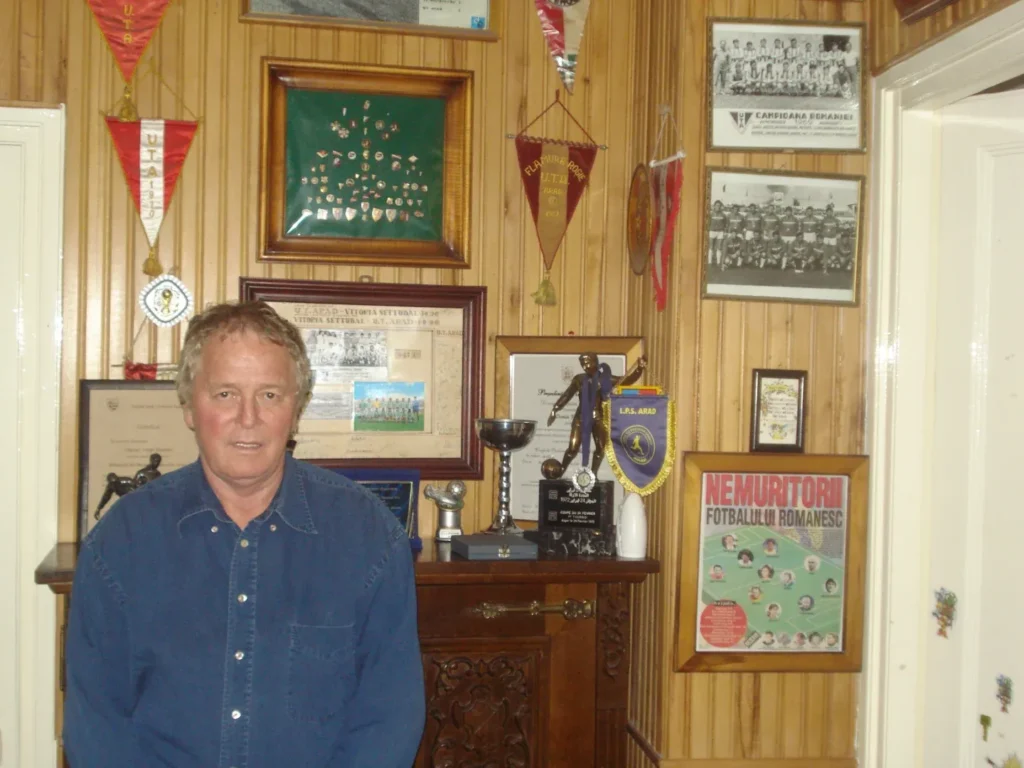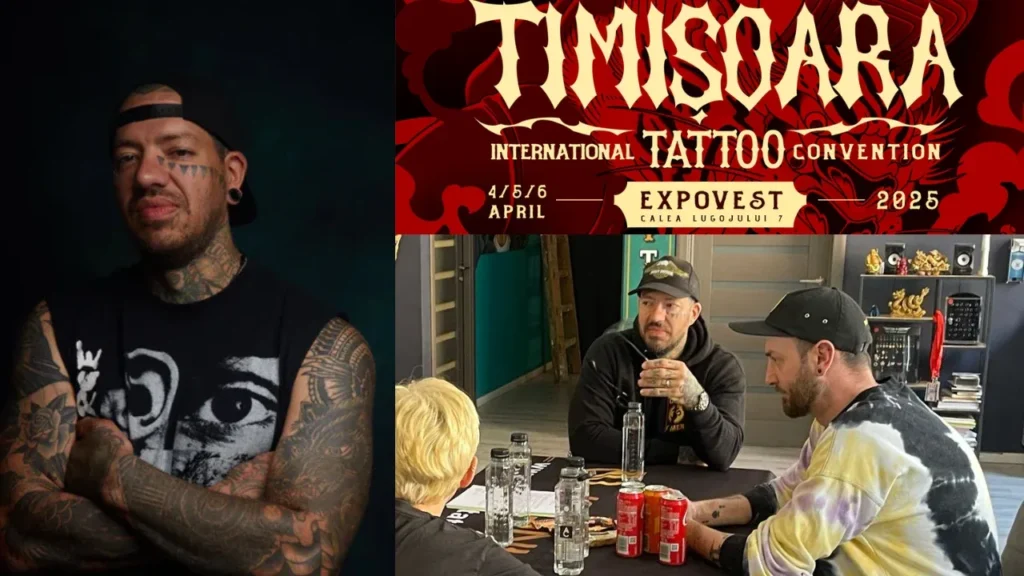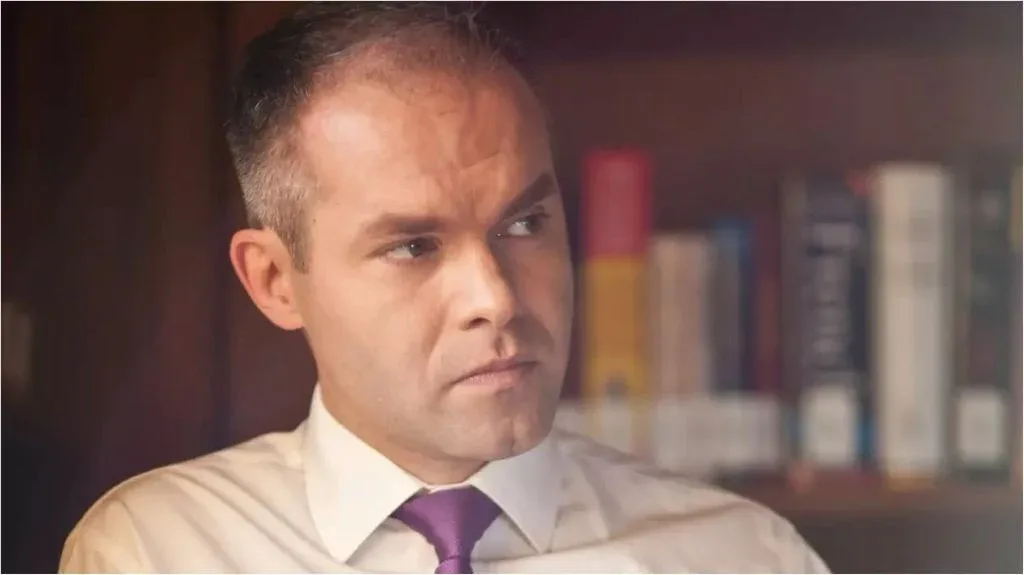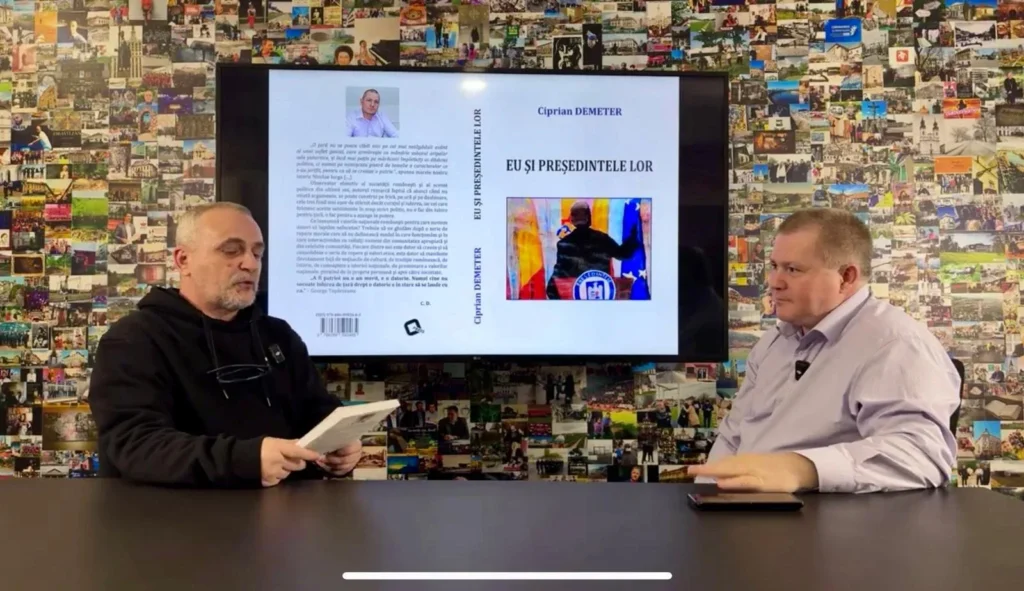Post-Educația Weekendul Educației
Între 7 și 9 decembrie Post-Educația a organizat Weekendul educației prin artă, un eveniment de trei zile cu activități speciale care vor încheia proiectul Post-Educația, derulat în Arad de Asociația Doar Mâine.
În prima zi a evenimentului pe 7 decembrie a avut loc o proiecție de film de la ora 15:00, urmată de o discuție cu adolescenții Vincent Adali și Leonard Pabisch care vor veni din Linz, Austria. Evenimentul a avut loc la Colegiul de Arte „Sabin Drăgoi” din Arad unde elevii au avut ocazia să vizioneze filmul și să discute apoi cu cei doi invitați.
Die blaue Stunde, despre ce este vorba?
Filmul Die blaue Stunde este o reprezentare a conflictului interior al Generației Z, împărțită între responsabilitatea pentru mediu și disperarea eșecului perceput, precum și între dăruirea altruistă față de societate și căutarea de sine.
Filmul este unul cu o temă necesară, ne prezintă deschis și clar mesajul poluării și uneori a lipsei de interes pe care unii oameni o prezintă până când această lipsă de interes ajunge să-i sufoce metaforic. Tema este una matură iar scenele sunt bine gândite fiecare scenă fiind simbolică dar și foarte estetică în același timp. Acest film combină cadrele frumoase cu realitatea în care trăim, combină scene în care natura întâlnește gunoiul. Regizorul Vincent Adali a făcut o treabă excelentă, vorbind cu el am aflat că filmul deși pare unul făcut de profesioniști acesta a fost realizat de o echipaă de adolescenți foarte talentați și pasionați.
Din punct de vedere al actoriei, personajul principal jucat de Leonard Pabisch reușește să prezinte natural adolescența și interacțiunile dintre personajul principal și oamenii din jurul său dar și emoțiile intense și conflictul interior care îl macină pe acesta.
Vincent Adali, regizorul filmului:
Leonard Pabisch, actorul principal din film:
Interviu cu Vincent Adali și Leonard Pabisch
Care este părerea voastră despre elevii acestei școli? Au fost perspicace? Au înțeles mesajul filmului?
Vincent Adali: Da, a fost dificil să înțeleagă mesajul filmului, dar credem că am avut discuții constructive. Am fost foarte bucuroși de primirea prietenoasă a oamenilor și de spiritul lor similar cu al nostru, al austriecilor.
Leonard Pabisch: A fost multă gândire critică și filmul ne-a arătat aspecte pe care nici nu le luasem în considerare.
Vincent Adali: Exact. A fost plăcut să discutăm despre aceste teme cu oamenii.
Au fost multe întrebări provocatoare care v-au făcut să reconsiderați filmul într-un mod diferit față de cel planificat?
Vincent Adali: Cu siguranță. O fată a remarcat că finalul filmului asemăna reciclarea umană, o perspectivă pe care nu o luasem în considerare, dar care sună interesant. Părea un aspect apreciat de ei.
Care a fost partea voastră preferată în realizarea acestui film? Ați avut parte de distracție făcându-l?
Leonard Pabisch: Lucrul împreună și implicarea într-un proiect important pentru toți. Fiecare scenă a fost extrem de plăcută.
Vincent Adali: Și, de asemenea, sprijinul imens primit de la toată lumea, elevi de la 10 la 18 ani și toți profesorii. A fost ca într-o mare familie – o experiență foarte plăcută.
Credeți că acest film poate inspira oamenii să recicleze și să fie mai atenți la mediul lor înconjurător?
Vincent Adali: Cu siguranță. Poate provoca diverse perspective asupra subiectului. Este deschis la interpretări, aș spune.
Care a fost cea mai critică sau cea mai importantă scenă din film?
Vincent Adali: Scena din biserică a necesitat multă atenție și multe încercări pentru a o finaliza. Am avut dificultăți în obținerea permisiunilor, lucru care a fost neașteptat de dificil.
Leonard Pabisch: Am avut COVID în timpul acelei scene, deși nu știam atunci. Am continuat totuși pentru a termina scena.
Ați primit ajutor profesional și cât timp a durat realizarea filmului?
Vincent Adali: A durat trei ani, filmul a fost încetinit de COVID și de obligațiile școlare. Nu am avut termene limită sau restricții, ceea ce a fost plăcut. Profesorul nostru, domnul Schwabiker, și școala au oferit un sprijin semnificativ. În plus, compozitorul profesionist Ron Hellein a contribuit cu muzică care s-a potrivit perfect.
Ați explorat orașul?
Leonard Pabisch: Da, și am fost plăcut surprinși. Nu ne așteptam să fie așa și ne-am bucurat de timpul petrecut aici.
Vincent Adali: Conversațiile cu șoferul nostru au fost încântătoare. Perspectiva lui asupra Aradului ca un oraș liniștit pentru oamenii în vârstă a fost interesantă. Îmi plac și bisericile și limba. Sunt foarte entuziasmat să explorez mai mult din România în viitor.
Care a fost experiența voastră cu Ars Electronica? O puteți descrie pe scurt?
Vincent Adali: Este un amestec imens de artă, știință și tehnologie. Oamenii și operele lor de artă au fost impresionante. Festivalul are o atmosferă fantastică, situat într-o clădire veche de poștă – un mediu foarte propice creativității.
Aveți ambiția de a avea o carieră în industria filmului?
Leonard Pabisch: Nu, îmi place să joc în filme când se potrivește cu proiecte ca acesta. Mă concentrez să devin fizician, poate să urmăresc aspecte din mecatronică.
Care sunt planurile voastre de viitor?
Leonard Pabisch: Îmi doresc să studiez fizica în Viena, inspirat de hobby-urile bunicului meu. Poate că voi explora și domeniul bancar ca un interes secundar.
Vincent Adali: Intenționez să lucrez în securitatea națională. După școală, planific să fac serviciu civil în Ierusalim și să studiez dreptul. Sunt interesat de lucru cu texte și de politică, influențat de experiențe precum Munon (Model United Nations).
Acest eveniment a fost o șansă pentru adolescenți să discute despre subiecte importante precum poluarea prin deșeuri, reciclare, să comunice între ei și să comenteze filmul folosind gândirea critică.
Prin aceste oportunități oferite elevilor să călătorească în alte țări și școli putem observa și consolida identitatea europeană pe care încercăm să o promovăm în U.E.. Identitatea europeană este un subiect vast și complex, care continuă să fie explorat și discutat în contextul schimbărilor sociale, politice și culturale din Europa contemporană.
The english Version of the article
Between December 7 and 9, Post-Educația organized the Weekend of Education through Art, a three-day event with special activities that concluded the Post-Education project carried out in Arad by the Doar Mâine Association.
On the first day of the event, December 7th, there was a film screening starting at 15:00, followed by a discussion with teenagers Vincent Adali and Leonard Pabisch, who came from Linz, Austria. The event took place at the „Sabin Drăgoi” College of Arts in Arad, where students had the opportunity to watch the film and engage in a discussion with the two guests.
The film, „Die blaue Stunde” represents the inner conflict of Generation Z, torn between responsibility for the environment and the despair of perceived failure, as well as between selfless giving to society and self-seeking.
The film delves into a necessary theme, openly and clearly presenting the message of pollution and sometimes the lack of interest that some people show, until this indifference metaphorically suffocates them. The theme is mature, and the scenes are well thought out, each scene being symbolic but also very aesthetic at the same time.
This film combines beautiful shots with the reality we live in, merging scenes where nature meets trash. Director Vincent Adali did an excellent job. In conversation with him, I learned that the film, although it looks like one made by professionals, was created by a team of very talented and passionate teenagers.
Regarding the acting, the main character, portrayed by Leonard Pabisch, succeeds in naturally presenting adolescence and the interactions between the main character and the people around him, as well as the intense emotions and inner conflict that wear him down.
Vincent Adali, the film director, shared:
„My name is Vincent Adali. I am 17 years old and I attend ‘Europagymnasium Baumgartenberg.’ I invest all my free time in film projects and foreign languages. It’s hard for me to pinpoint the moment that sparked my passion for film. So far, it feels like it’s always been that way. However, I know that from a young age, I loved to work creatively and practically. Film is perfect for this because it’s such a versatile medium. It encompasses everything from the writing and planning process of the film to the sound and photography techniques involved, the actual work with the actors on set, and finally, the editing process.
I acquired the technical and practical skills necessary to bring the film to life not only by reading specialist books and conducting online research but also through an intensive course at the ‘Prager Fotoschule’ and in-depth conversations with my close relatives, especially those with my father, who, through his work as a photographer, is familiar with solutions to technically complicated problems. At the moment, I have already directed two experimental short films that focus on how a film can ‘get under the skin’ using audiovisual means.
I recently realized that making a film is a collaborative effort. It’s a time-consuming process that can only be accomplished with a team dedicated to the idea and the film itself.”
Leonard Pabisch, the lead actor in the film, shared:
„I was born in 2006 in Boecillo, a town in the north of Spain, and I stayed there with my mother for nine weeks. However, soon after, my mother decided that it would be easier to raise a fatherless child in her homeland, Austria, than in a country where she does not even speak the language.
I grew up on a farm in a small village where I lived until 2020. Therefore, animals were an important part of my life and shaped many of my interests and everyday life. I started attending a school in a nearby village where I will finish my A-Levels next year. After that, I plan to study physics in Vienna.
I’m pursuing a mechatronics apprenticeship at the same time because two years ago, I thought it was a brilliant idea. However, after doing a mechatronics internship last summer, I started to doubt my 15-year-old brilliance. My Mexican father re-entered my life when I was twelve, and I’m trying to get to know him as much as his school and work schedules allow.
Over the past years, I’ve attempted to gain as much work experience as possible, but my efforts have not paid off yet because I haven’t found the right work environment for me. Currently, I’m channeling my energy into keeping myself mentally and physically fit while exploring everything the world has to offer.”
Interview with Vincent Adali and Leonard Pabisch
What do you think about the people from this school? Were they perceptive? Did they get the message of the movie?
Vincent Adali: Yes, I think it’s hard to get the message of the movie But I think we had constructive discussions And we were very happy about the friendly welcome from the people and they have like-minded spirits they are similar to us Austrians.
Leonard Pabisch: There was a lot of clever thinking process And there were aspects of the movie and shown to us that we didn’t even know about.
Vincent Adali: Exactly. It was always nice to talk to people about these kind of things.
Did they put a lot of questions? Questions that may provoke you thinking about the movie in another way that you planned?
Vincent Adali: Definitely, I mean One girl pointed out that the end of the movie was like recycling humans And I never thought of that aspect but it sounds so great. In the play At the end I think that was an aspect they liked.
What was your favorite part in doing this movie? Did you have fun doing it?
Leonard Pabisch: Just working together and being together and having a project that is important for everyone, all of the scenes we did, everything was extremely funny.
Vincent Adali: And also to have the whole support of the whole school The children from 10 years to 18 years old and all the teachers it was a good feeling like we were a big family. It was very enjoyable.
Do you think this movie can give people a push over to recycling and being more careful with their surroundings?
Vincent Adali: I think it definitely can But it can also provoke a whole different point of view on this subject. It’s open for interpretations, I would say.
What was most critical or the most important scene in the film?
Vincent Adali: It took A lot of attention and a lot of takes to finish it, I think the one in the church because we would have to ask for permission and that was very difficult. Before I made the movie I was so naive I didn’t think that we would ask for permission at so many places and then we noticed that for example the yard in front of the school doesn’t belong to the school so we had to ask people and we were rejected a couple of times.
Leonard Pabisch: Also in the scene of the church I had COVID so I was ill and I had an extreme headache but we kind of did it anyway because I didn’t know I had COVID at that time so we just finished the scene.
Also, just a few things were spontaneous. We planned out to the last detail and we also had a face mask, I don’t know if you can see it that good but I had to put on a face mask so my skin looks more shiny In the movie. It seems like it’s really hot because I’m taking off everything but it was cold It was actually really cold because in the church it’s all too cold It was not comfortable shooting . But looking back to it it was very nice and we had still a fun movie.
Yeah, that’s right, It’s my favorite scene I would say.
Vincent Adali: Also because you also mentioned that we had COVID at that time we also talked about it in the discussion. That it’s kind of like a document of time and it’s very interesting to look back at it and to see the streets, to see our school and it’s a whole different world for me.
Did you had any professional help? How long did it take to make this movie?
Vincent Adali: Three years, we started very early on and then COVID slowed the whole process down a bit and also we had to do some things for school and we wanted to take our time because we had no deadline. We had no limitations. That was also very enjoyable for us because we were just free to do anything what we wanted.
And for the professional help we had definitely a lot of support from our teacher Mr. Schwabiker and our school.
Vincent Adali: And the general YouTube videos helped a lot. The sound is, I always forget the aspect of sound Is made also by us but the music is from Ron Hellein And he’s a professional composer And a musician from Germany And he helped us with the project And the music, it fits very well I think.
Have you visited around the city?
Leonard Pabisch: Yes We took a walk And so far we are very surprised We didn’t expect it to be like that But we are surprised in a good way We really enjoyed it.
Vincent Adali: Also we talked a lot with our driver and it was very interesting to see his point of view. That he is very happy to live in Arad because if you’re getting older it’s nice to live in a quiet city. And I also like the big churches and I like the language. I’m very very excited to visit more of Romania tomorrow and today and hopefully also in the future. I will come back and visit more of the country again.
What was your experience with Ars Electronica? Can you describe it in some words?
Vincent Adali: It is this huge building in the middle of the lands and it’s a mixture between art and science and technical stuff and the people there, their artworks are really great. They are extremely helpful and they also have a lot of space for the creators and the festival of course, which I visited two times now And it has such a nice atmosphere. It’s in an old building where formerly the post was in.
And you have this feeling of a big factory and there are all these art projects in it. This is very tasteful and as I stated, the people are very creative and they’re very helpful in supporting creativity.
Do you want to be in the future, maybe, do you want a career in the movie industry?
Leonard Pabisch: No, actually I’m not trying to pursue on any acting careers, I really like acting but only when it fits like this project. When somebody comes up to me and says „hey, please act in my movie”. And also we did a theater school and I really enjoyed that But I’m not trying to be an actor or anything.
What’s your future plan?
Leonard Pabisch: I want to be a physicist I always like the technical aspects of everything. I also do apprenticeship as a mechatronic right now so maybe I will do something of that in the future too. I will study physics in Vienna And probably because of the influence of my granddad. He was a banker of a private bank and as a hobby he did physics and I’m trying to do it like in reverse, I’m going to be a physicist and as a hobby I’m going to be a banker of a private bank.
Vincent Adali: I want to work in national security, after I finished my year at school I want to go to Israel to do a civil service in Jerusalem and I want to study law because I’m very interested in working with texts and also in politics because we also went to the Munon. It’s a model United Nations It’s very interesting. Yeah that’s my plan.
This event was a fantastic opportunity for teenagers to chat about important matters like waste pollution, recycling, and to really get into the movie using their critical thinking skills.
By giving these students the chance to travel to other countries and schools, we get to see and strengthen that European identity we’re all about in the EU. European identity is like a patchwork – with each piece bringing something special: the culture, languages, customs, and history of each country in Europe. It’s like having a bunch of friends from all corners of the continent, each bringing something unique to the table.
At this event, besides discussing the movie, the young ones shared stories and talked about what they have in common and what makes each country’s culture stand out.
